#WHICH I GET. GOOD META STORYTELLING. but I doesn’t change the fact its a bit boring at certain points
Explore tagged Tumblr posts
Text
As much As I LOVE this game to bits and pieces so far— the gameplay can get kinda tedious 😭 esp when you have to redo certain things over and over again
#IM STICKING TO IT FOR THE DIALOUGE/CHARACTERS/ART#(but I’m stuck in act three bc apparently I missed 2 openphrases and I have to do the friendship quest to get-#-mirabelle to read the book on the third floor. AND IM NGL ITS 😭 KINDA GETTING BORING REDOING THIS#Everything in this game is A+ to me besides the gameplay#might be more of a ‘me’ thing but MAN#and nooooo dont give me the ‘ohhh but that’s the poooint you’re supposed to feel what Siffrin is feelingggg’#WHICH I GET. GOOD META STORYTELLING. but I doesn’t change the fact its a bit boring at certain points#not tryna be ‘the whineeeerrr’ or anythin but it IS getting to a point where I’m considering watching the playthrough for the rest of it.#instead of playing#<<<CAUSE AGAIN. LOVE THE FUCKING STORY. LOVE THE CHARACTERS. IM STARTING TO KINDA HATE THE GAMEPLAY IS ALL.
2 notes
·
View notes
Note
re: that ask you posted a couple days ago about the male and female representation in RWBY, part of what makes RWBY's whole 'girl power' thing ring exceptionally hollow to me is the fact that there are like... no women in positions of real power in remnant. like at all. except the big bad.
winter is second in command to james. glynda is second in command to ozpin. all of the headmasters are men (for no discernible reason, imo; why theodore and not dorothea?). the leader of the ace ops was a white man (and then winter seemed to take over clover's position instead of either of the women of color on the team, and she was still second to james). RWBY is an all girl team, but JNPR was led by a boy despite a girl arguably being far more qualified (pyrrha). the happy huntresses are all women, and robyn had no real power to speak of--she didn't even manage to win the election, because jacques rigged it, and then the council ceased to matter. there was one (1) woman on the council, but she was so inconsequential that i can't even remember her name. (i suppose we're lucky it was the guy and not her who james shot lol) jacques controls the SDC instead of willow, even though he's not even a schnee by blood and actually married into the family for power. (and we don't even know how he got it over his wife.)
and then there's the white fang, which ghira led and not kali--and it's ghira who leads menagerie itself, while kali seems to be a housewife. sienna had five minutes of screentime before being brutally killed and her position assumed by adam, a man. cordovin is basically a one off lackey we haven't even thought about before or since. neo was second to roman. you have cinder, sure, who is a second but to salem, a woman, and raven as the leader of the branwen tribe--but what does it really say about your 'girl power' narrative when the only women with genuine systemic power in your world are villains or antagonists with massive bodycounts??
atla has the same sort of problem--a couple great female characters, but all the leadership positions are men (except the kyoshi warriors, an all girls group, and even then the leader of their island is an old man) and the one female mentor figure also turns out to be evil--but it at least has some great writing to help overlook that fact, and it came out in the mid-00's and so has some sort of excuse of being a product of its time. but rwby didn't even start until 2013 and it's still going and still making these kinds of decisions well into 2021.
where is this supposed girl power, exactly? am i really supposed to overlook the very patriarchal worldbuilding just because the title characters are girls?
That's an excellent summary of the situation, anon, and as with so much in RWBY, it comes down to the full context. Any one of these examples isn't necessarily going to mean much on its own. It's when you look at the pattern that you can start making a case for those conclusions: Why is the show marketed on "girl power" set in a world where men hold the vast majority of that power? And, more importantly, why is that setup not the point? We could easily have a story where that lopsided gender dynamic is the problem that the girls are looking to fix, but... that story doesn't exist. Like the problems discussed with Jaune, the supposed point here exists only on the surface. Dig just the tinniest bit — the above — and you hit on a lot of structural problems with this "girl power" world.
To add just a few details to what you've already said:
Salem indeed has power, but she's never allowed to fully use it. Each volume the frustration with this grows as Salem accumulates more abilities and then just sits on them. From literally hiding out for a thousand years to worries that she won't use the Staff in Volumes 9-10, Salem really isn't allowed to be the threat she's presented as on the surface. And yes, this is absolutely due in part to the "She's too OP and the writers don't know how to let her be that powerful while still having the heroes win" issue, but again, context. That problem doesn't exclude others occurring simultaneously.
Same double explanation with Summer. Yes, dead moms are an incredibly common trauma to dump on a protagonist, but it still left Yang and Ruby with Tai as their primary influence. And Qrow. The uncle becomes the extended family influence while Raven is the absent one/eventual antagonist. It's personal power as opposed to political power, but Tai, Qrow, Ozpin, formerly James... most of the mentors are men. Maria, a key exception, has been ignored in that regard. The story announced that she was Qrow's inspiration, setup her being Ruby's new mentor, and then... nothing. Nothing has come of that. She disappeared for a volume and then went off to Amity and was literally forgotten by the story when evacuating everyone was the finale's whole point.
Like that Endgame moment I mentioned, the Happy Huntresses feel a little too forced to me. Yes, it's the same basic idea as in ATLA, but ATLA, as you say, has a lot more going for it. The Happy Huntresses feel... on the nose? Idk exactly how to explain it. Like, "Here they are! Another team of all women! Isn't this how progressive storytelling works? Just ignore how this is a one-off team of minor characters compared to the world building issues discussed above." And if you're not paying attention, you miss just how insignificant they are, with a side of Robyn being, well, Robyn. The Kyoshi Warriors, at least, are based off of Kyoshi. A woman avatar who is a significant part of their history. That is, presumably, why they're an all women warrior group (but who notably still teach Sokka). The Happy Huntresses are all huntresses because...? There's no reason except that meta "We want to look progressive" explanation. Just like having all the women superheroes team up for a hot second so people get excited and ignore the representation problems across, what? 21 films? Don't get me wrong, I love that May is among the Happy Huntresses. I think including her in the explicitly all-women group was one of the better things RWBY has done in a long time, but the rest is still a mess.
RWBY is arguably about these smaller groups as opposed to systematic power (despite the writers trying to work that in with things like the White Fang and the election. Not to mention the implication that everything in Atlas is fine now that evil Ironwood has died and taken the symbol of wealth (the city) with him. We saw a human holding hands with a faunus after all. Racism and corruption solved, I guess.) So yes, our group is dominated by women... but Whitley is the one saving Nora, helping to defeat the Hound (plus Willow), thinking of the airships, and providing the blueprints they need to escape. Salem is our Big Bad, except Ironwood is the one the volume focuses on. Ruby is our leader, but Jaune is the one leading the group into the whale and getting praised for how heroic he is. Ren does more to shake things up, even if he's painted as the one in the wrong. Oscar gets to confront Salem and destroys the whale threat. Ozpin provides the information they need to evacuate. Meanwhile, when the girls do things in Volume 8 it's almost always followed by a long-stint of passiveness. Nora opens the door so she can be unconscious for most of the volume. Penny keeps Amity up so she can also be unconscious for a good chunk of time. Ruby sends her message and then sits in a mansion. Blake fights so she can tearfully beg Ruby to save her. Weiss, as said, takes a backseat to Whitley (and Klein). They forward the plot, absolutely, but comparatively it doesn't feel like enough.
It's that pattern then, no one specific example. More and more the personal power, not just the systematic power already built into Remnant, seems to be coming from the men. Not all the time, but enough that scenes like the tea drinking moment feel like a part of a much larger problem. Pietro taking control, Watts hacking, and Ambrosius literally remaking her when Penny is supposed to already be in control of herself and her fate. Winter being presented as the active mentor to Weiss, only to turn around and claim that Ironwood was actually responsible for everything. Ruby, Weiss, Blake, and May straight up commenting on how awful things are out there while Yang, Jaune, Ren, and Oscar lead the charge against Salem — with the latter three doing the most to forward that mission (no fear, semblance, cane). As others have only half-joked, Yang's supposedly badass moment was bringing up a mother she's ignored for six volumes and briefly blowing up the immortal woman for a couple of seconds (with Ironwood's bombs). Even Marrow is arguably the most significant Ace Op after Clover. Vine isn't actually a character, Elm slightly less so, Harriet is there to go crazy and try to drop a bomb (notably before admitting to never-before-existed feelings for Clover), but Marrow? He's the one who breaks out. Who is meant to heroically stand up against Ironwood. Who comments on how awful it is that teenagers are fighting and, regardless of how messed up the moral messages are, is supposedly pushing for active change while all the women in his group, including Winter, insist on maintaining the status quo. Look at all these choices as a whole, it makes throwaway worldbuilding choices like "All the Maidens are women" feel pretty hollow. Why does it matter if Amber is a Maiden if she dies in a flashback so Ozpin can struggle to pass on the power? If Pyrrha dies before becoming one so Jaune can angst about it? If Raven is one and then disappears from the story entirely? If Winter has enough power to break Ironwood's aura, but supposedly had no power throughout every other choice she made getting here? If Penny is one, but is continually controlled by men and then asks another man to help her die? It's just really unconvincing, once you look past the surface excitement of a woman looking cool with magic powers.
When you do consider the whole of the story — both in terms of our world building and who is forwarding the plot in the latter volumes, getting the emotional focus, being proactive, etc. — there are a lot of problems that undermine the presumed message RT wants to write. They say, "girl power" by marketing RWBY with these four women, but too many of the storytelling decisions thoroughly undermine that, revealing what's likely a deeply ingrained, subconscious bias.
64 notes
·
View notes
Text
So, Word of Honor, Episode 36 (and “Episode” 37) again, because I want to do a little bit more unpacking of this, particularly with some of the extra material and information that people have been able to point me to.
Spoilers, obvs. For right now, I mainly want to pull out this bit of my initial reaction to 36 & 37, because I think it remains a key point for me:
It would be nice, though, if the connective tissue from 36 to 37 made any sense. Or existed whatsoever. Just, like, throw me a bone, show, some kind of explicit hand-waviness that actually gets mentioned for why Ye Baiyi apparently was not as smart as he thought he was and didn’t really know what he was talking about when he was doomsaying about how one of the pair will surely, oh surely perish. None of this “Sooooo, they managed to figure out the technique and master it?” from some random shidi who never actually gets an answer. I mean, the door was left open for fanwankery on this one, with what looks to be a very last-minute conceit of all this being a story told by grown-up Chengling to his disciples, which begs the question of how much of what he’s telling them is totally accurate, given any number of issues …
I do feel like there’s an interesting meta thing going on here, in that the entire show has been about – let’s be honest, it was never really about the plot – queer-coding this couple in ways that supposedly fly enough under the radar that people can handwave them as Just Good Friends and Brothers (I mean, I guess) with a Bury Your Gays tragic ending (ugh) for good measure. And Chengling is telling a story in-universe that seems to conform to some of this same formula. And yet, we all know well and good that these guys were husbands … So are we supposed to carry the same assurance out of the show, on a meta level, that what appears to be happening in the story at the end of Ep 36 – what we discover we’re learning through Chengling’s story-telling, isn’t really the truth? Just, look: While we’re getting the Good Friends and Brothers push, there’s stuff like obvious voice-over work that doesn’t match the much more queer version of what the actors actually said, which is apparently blazingly clear to any viewers who know Mandarin and can manage to lip-read. The show has literally put de-queered words into these characters’ mouths. You can’t trust what you hear. But apparently the show has also made this obvious enough that, if you’re a good enough speaker of the language the show is being told in, and you have a good enough eye, you can see what is actually going on. Are we being taught to trust our eyes more than our ears, are we being told that what we’re being told – by the end of Ep 36 on a meta level, by Ye Baiyi-through-Chengling’s-story on an in-universe level, and by what we learn about what happened from Chengling’s story, itself, also on an in-universe level – is inherently untrustworthy, but that if we “speak the language” of this show well enough, and have a good enough eye, we can decode it and see what “actually” happened and is later made explicit in Ep 37?
So, that’s a lot, but the reason I wanted to pull it back out is because I feel like this no-homo, surface-level, smoke-and-mirrors effect that gets layered over a queer bedrock of “reality” is precisely what the show did with its ending, and I want to approach that on a couple of different levels. Particularly since I’ve seen several reactions from other people who didn’t seem to have seen/didn’t have access to the extra of “Ep” 37, or who also found it difficult and vaguely unsatisfying to make the leap from Ep 36 to full belief in, and commitment to, “Ep” 37.
When I first posted this, I was really leaning on the idea of a classic Rashomon effect, given that we see – imho – a final Zhou Zishu/Wen Kexing scene in Ep 36 that’s filmed to lead us to believe that Wen Kexing died, with a subsequent cut to Zhang Chengling wrapping up a telling of the “story” of ZZS and WKX to his disciples. The easiest fanwank on this is that all of what we’ve seen so far has been Chengling telling the story of ZZS and WKX to his disciples, making him an unreliable narrator who in fact doesn’t know the truth of what really happened. I was actually reminded of the contrast in The Untamed (god, I don’t need to warn for spoilers for The Untamed, do I, we’ve all seen Chen Qing Ling at this point, right? Anyway, SPOILERS FOR THE UNTAMED) between the cliff scene in Episode 1 when they make it look like Jiang Cheng stabbed Wei Wuxian, leading to his fall off the cliff, and you go back later and realize this is the version that the storyteller was telling to the people in the teahouse vs. Episode, god, what is it, 33? When we see the cliff scene in “real” time, and discover that’s not what actually happened, that what happened is that Jiang Cheng stabbed a rock and Wei Wuxian shook himself free of Lan Wangji’s grip to fall to his death. You can’t trust what you hear. Also … well, we’ll get back to Chengling in a minute.
The second level of uncertainty to unwind is Gao Xiaolian calling bs on Chengling’s story. So, I felt like the kid who’s practicing his forms in the snow and being coached by ZZS in “Ep” 37 might actually be someone, not just a random kid, and that might be important, but I could not for the life of me figure out who he might be. I wasn’t aware until I watched some of AvenueX’s wrap-up of the show (I think that’s the first place I heard this info pointed out) that this kid is supposed to be the son of Gao Xiaolian and Deng Kuan, and the dad who comes to take him home is Deng Kuan (formerly Da-shixiong of Yueyang Sect, who – let’s face it – Gao Xiaolian really wanted to marry). Seriously, I spent so much time making fun of ZZS’s stupid facial hair tricks in this show, and then they actually do just put a dumbass mustache on a guy, and I completely don’t recognize him. I have to admit, the mustache threw me enough that I had no idea that was Deng Kuan (well, and maybe only seeing him for three episodes also helped). But if that’s Deng Kuan, and if the kid is his and Gao Xiaolian’s son, then she would have some reasonable standing to know a story detailing WKX’s death was bs.
Finally, and most crucially – thanks to everyone who directed me to resources (including AvenueX and other fans who were able to do some translation) who were able to talk about the voiceover work in this final ep, because when I talk about how you can’t trust what you hear, but if you speak the language well enough and have a good enough eye, you can catch what’s really going on? When I talk about de-queered words being put into these character’s mouths? Apparently, this is what happens to Chengling in the final scene. That last scene - and the story he tells his disciples - apparently DOES provide the connective tissue from Ep 36 to Ep 37, but you can’t trust what you hear. Apparently, this is one of the places where you can see something different from what you hear if you’re able to lip-read, with Chengling telling the disciples something much closer to the idea that two people who love each other equally can equally support each other through this cultivation technique and both come out alive.
In the AvenueX discussion of this (Livestream #21, starting around 1:22:30), there’s an additional tidbit about the use of the word “cauldron” – I believe by Ye Baiyi - to describe one person in the pair, a word with a specific and widely-understood meaning within the genre that’s not necessarily known outside of the genre with, yes, sexual connotations. (Come on, slash fans, don’t tell me you don’t giggle every time you pass a perfectly innocent Jiffy Lube auto shop, at something that the mundanes don’t think twice about.) Apparently, “cauldron” is in the script, I believe it’s in the English subs, and it apparently was in the original Chinese subs, until too many people started talking about it and how it had been slipped past censorship, because it’s a perfectly common Jiffy Lube auto shop, right? and then it appears Youku went back and changed the character in the Chinese subs to something that doesn’t even make any sense. So again, we get an example of a case where if you’re a good enough speaker of the language this show is being told in – in this case the vernacular of wuxia – with a good enough eye, you can catch what’s really going on. Something that then gets no-homo’d. And has some nonsensical de-queered meaning laid over top of it. How many times do we have to do this until we learn the lesson that you can’t trust what you hear?
ANYWAY, I’m wondering if the visuals are important, too: Something we see in the last scene with ZZS and WKX in Ep 36, when WKX is either unconscious or dead (CLEARLY UNCONSCIOUS), is that ZZS – twice – doesn’t let WKX’s hands fall. He catches him by the wrists and then catches him again by the hands as WKX’s hands start to slip away from ZZS’s hands – aaaannnnd end scene. I have to wonder if that’s not a subtle but important detail, that we see ZZS refusing to let WKX physically slip away, and maybe, by implication, refusing to let WKX slip away from him into death.
Also, again with Ye Baiyi – in the flashback when WKX is yelling at ZZS, Ye Baiyi says “No one dies!” as he comes bursting into WKX’s sickroom. And then even reiterates it – “No one dies before me!” But then the voiceover during the qi transfer, he’s supposedly going on about here’s how WKX is going to have to kill himself to save his husband? I think the script has dropped the ball in a few places, but that would really be a tremendous flub. That also deserves some unpacking, but I’m running out of free time right now.
So, just some additional thoughts. I will probably have more, but next up, I think, will be a re-watch from the beginning.
One last thought, tho’: What’s the likelihood that Nian Xiang is Actual A-Xiang and Goa Xiaolian’s/Deng Kuan’s kid is Cao Weining, reincarnated?
#zhou zishu#wen kexing#zhang chengling#gao xiaolian#deng kuan#ye baiyi#word of honor#word of honor episode reax
57 notes
·
View notes
Text
Why the Dream SMP’s way of storytelling is IMPOSSIBLE to recreate in any other medium.
This has been in the back of my mind for the longest time. I think I finally got it.
People have talked about this before, and they’ve put forward some good points, and good for them – most of them are correct. It’s the way the ccs interact with each other, it’s how plot is mixed in with banter, that’s all good! I wanna put more out there.
So you know how you open a book to read, you start a new show, you sit down to watch a movie – that’s all produced by some sort of company, someone who made it specifically for you to enjoy. You expect a certain dramatic flair to it, certain cinematic choices, certain ways of writing, certain camera angles, certain reactions to things. That’s just ingrained expectations of things now.
The DSMP? Doesn’t have that.
The low expectations work very much in its favor. It’s a Minecraft role-playing server with a bunch of famous youtubers/streamers, who are all good friends and have great dynamics with each other. So when you expect “just another Minecraft video” but in stream form, or you watch the videos because there are certain people in them, you don’t expect to be dropped into extreme lore and sensitive topics, realistic situations proposed in game form, a combination of serious stuff and just fun times with friends goofing around – and you’re pleasantly surprised.
We, the fandom, are used to it a bit more now. How excellently they manage to make a serious story in such a “ridiculous” medium, how much it affects us all and gets our creative juices flowing. But even the ccs can’t predict some of the things that happen. And that’s fun.
The whole election ending the way it has? That was on us. And it made some of the most angsty content there has been in the DSMP. People still theorize about the arc and make connections to now – that’s pog!
Fundy being adopted by Eret – that sparked the whole “Fundy just wants a dad – let’s get him some love” thing that made FundyWasTaken and other Fundy+someone ships happen. I see a different person paired with Fundy every week, and somehow, I agree with all of them. I really got into Fundy because of that stream where Eret “slept through the adoption” and Fundy confronted his real dad and spent time with his granddad. That little stream gave us more insight into Fundy’s whole character (Nevermind Fundy showing off his acting skills – you go you funky little fox), but also justifies some of his actions now. DryWaters? Wanting to kill Technoblade? Fucked up reasons, but we still love him.
Phil being broken out of house arrest ahead of time – still made a great stream and Phil agreeing with Techno’s want for revenge – that made us all very happy. The SBI!!! The AE! And that’s also a thing!
That even if we do know or have predicted what’s going to happen, begged it out of the ccs basically, it is still incredibly fun to watch. Where some books/shows/movies fall short and reveal too much and end up being “too predictable”, they’re not fun anymore. I read this somewhere before, that sometimes holding back EVERYTHING from the reader, and relying on shock value to make a good story is just bad. Whereas if you progress the story naturally and let the reader make some predictions of their own and then they end up being right – that’s a lot of serotonin right there. It’s the re-readability that makes it slightly better the second time.
The DSMP takes this concept and fucking yeets with it. Letting fans engage in the story, letting them theorize and then be right, even acknowledging the fanart that was made, just engaging with the community that their roleplay created – that makes it so much more fun. I bet that even if the whole script was revealed to the fandom we would still watch every plot stream. Even if we knew vaguely what happens in the stream, we would tune in and enjoy every second of it. Because the ccs are just that good, we love them that much, we love this plot that much.
Oh and the unpredictability helps too. Tommy in exile was the vague concept of a lot of the streams – it’s taken that and ran with it in a lot of different directions. All quite enjoyable.
Having said all of that… The fact that this type of telling a story is impossible to recreate in any other medium is… kinda saddening? It is incredibly unique, and I’d say has things that not a lot of the people that produce mainstream media would even consider. “Just friends hanging out” – how would that make the script progress? “Engagement with the fandom, even considering their wishes for the characters” – but we’re telling a story here!
The only thing I can think of that would come close to the vibe, would be just a bunch of writer friends coming together, thinking up a universe and general plot, and then each deciding to write a few of their own characters in that universe. When one author focuses on their main characters, the side ones can feel left in the dust, or not fleshed out. The DSMP is just “every character can write their own story”, which takes a lot of the strain from the “main writers”. But the general thing of “just friends hanging out” would be taken away from it. We’re being serious here, why would we change the tone so quick?
With all of that in mind… I kinda wanna make some predictions? And I don’t know if they’re correct, but it’s fun to theorize. See?
1. L’manburg will die.
And not just because Techno has 54 withers. The country is cursed – it definitely is. There is little sentimental value that can be felt for a few flimsy stilts built on top of a crater. It might go out in a blaze of glory, with the withers (Is history repeating itself an interesting enough plot point to recycle a whole arc?), but it might just be forgotten. Yeah there have been some angsty headcanons about how “no one cares about L’manburg anymore, save for two people” and it just gets abandoned, but how about it just becoming irrelevant?
This all comes back to Dream, it always does! His want, need for the server to be “one happy family again”, it just means one thing. He wants the server to return to the peaceful anarchy that it was before L’manburg. No rulers, no factions, no nothing.
That’s never going to happen.
Try as he might, Dream cannot affect that change that L’manburg did to the server. The introduction of a faction, one that can exist without the interference of a higher power – why do you think so many factions have sprouted up since? And it’s not even serious factions a lot of the time, it’s just a few friends deciding to build their bases on a plot of land that they claim is a nation now. L’manburg has changed the mindset of these people, now an alliance with somebody is a political move. An alliance doesn’t exist if it doesn’t have a faction, and that faction can remain neutral for only so long.
Basically, L’manburg introduced the factions mod into the server.
And the fact that every faction now has enough relevance to hold weight in a war also means that every nation on the server is doomed to follow the downfall of L’manburg. Eventually, they will get into a fight they can’t win, go up against the wrong people, anger someone they shouldn’t have. All factions will either be destroyed, or lose relevance, until their creators, residents and such just… move on.
(And really you can go into meta and talk about real governments and compare them, but it’s far more simple than that. The server isn’t built for peace, it isn’t meant to be a relaxing place where you can just vibe, it may have been made for a few friends to play Minecraft together, but it has turned into An Author’s Curse. The curse that follows any kind of story being told – the fact that peace is boring. People watched the first streams of the DSMP because they liked the ccs, and that’s valid. But how many more people tuned in to watch the war streams because there was PLOT and there was CHAOS and there WASN’T CALM PEACE ANYMORE – that’s the curse of every writer. That you can write about someone just living their life drama-free, you can make interesting peace with characters or circumstances, but it’s always leading to one inevitable conclusion – war, drama, because people read that. And at this point, it’s just a predictable outcome. No matter how much you say that you are retired, that you’re done with violence (Technoblade), something will happen that will prove to you that you believed in people too much. No matter how “neutral” you may be in the matter, no matter how much you claim that you have no allegiance (Philza), you will be forced to pick one, because out of all the bad things, you pick the least worst one, the most appealing to you, the one that can benefit your want of revenge.
And I can go on, but this is far too deep for one simple reason – The Author’s Curse is so prevalent here because THERE ARE ABSOLUTELY NO STAKES. It’s a video game – you die? You respawn. Something gets destroyed? You can just rebuild. Sure, you’ll want to kill the person who did wrong to you, but whatever they did wrong can just be replaced, remade, recreated. So why not have wars? Why not cause massive amounts of destruction “for the plot”?
It’s literally a playground. How all authors have their little playground with their characters that they meticulously plan out, the DSMP is that playground for all of these people.
And it’s fun! Sure! I like it! I’m just really skeptical whenever someone in character says that they “just want peace”, “are retired”, “swear off violence”, “are building just a little city for themselves”. Because you can do that, nothing wrong. But eventually, no matter how much you distance yourself from all of the chaos happening, all of the wars, you will return.
Because it is just much more fun.
It’s the curse. A cursed cycle.
And everyone is in it.)
2. The prison.
I don’t have anything on the prison because I don’t have anything on the book. Yeah I’ve done a whole post where I overanalyze what it could be, but it doesn’t make it any clearer. Whatever it is, it’s made out to be a huge plot point, something that can only be revealed when the prison is finished.
Cursed. The prison’s reason for being constructed is the book, but the book is only relevant when the prison is finished. We can only wait, and theorize, as we do.
(My only theory is that the book is information about another op on the server. Or at least something related to op or creative mode. Dream only fears one thing on this server, and that’s Technoblade, so if his one fear is the most skilled player on the server, what else could give him existential fear?)
3. The SBI.
Again, I don’t have anything! Yeah the reunion seems to be going smoothly, one member at a time, but there is already conflict in their beliefs among each other. And all that’s happened is a vague “maybe one day we’ll strike”.
Is history repeating itself an interesting enough plot point to recycle a whole arc?
Is L’manburg’s destruction AGAIN really necessary to hammer home the idea that no one likes that place anymore?
I don’t know. Whatever happens, no one’s in the right. No one’s in the wrong either. They’re all not good people and that’s that on that.
4. The Clingy Duo.
AAAAAAAAAAAAAAAAAAAAAAAAAAAAAAAAAAAAAAAAAAAAAAAAAAAAAAAAAAAAAAAAAAAAAAAAAAAAAAAAAAAAAAAAAAAAAAAAAAAAAAAAAAAAAAAAAAAAAAAAAAAAAAAAAAAAAAAAAAAAAAAAAAAAAAAAAAAAAAAAAAAAAAAAAAAAAAAAAAAAAAAAAAAAAAAAAAAAAAAAAAAAAAAAAAAAAAAAAAAAAAAAAAAAAAAAAAAAAAAAAAAAAAAAAAAAAAAAAAAAAAAAAAAAAAAAAAAAAAAAAAAAAAAAAAAAAAAAAAAAAAAAAAAAAAAAAAAAAAAAAAAAAAAAAAAAAAAAAAAAAAAAAAAAAAAAAAAAAAAAAAAAAAAAAAAAAAAAAAAAAAAAAAAAAAAAAAAAAAAAAAAAAAAAAAAAAAAAAAAAAAAAAAAAAAAAAAAAAAAAAAAAAAAAAAAAAAAAAAAAAAAAAAAAAAAAAAAAAAAAAAAAAAAAAAAAAAAAAAAAAAAAAAAAAAAAAAAAAAAAAAAAAAAAAAAAAAAAAAAAAAAAAAAAAAAAAAAAAAAAAAAAAAAAAAAAAAA.
That’s all.
(Okay seriously? All of these arcs are connected. You know what happens when everything seems to be connected to one another?
A giant, dramatic final showdown between the two opposing sides.
Cause it’s just Chaos vs L’manburg. Those are the sides. People that want L’manburg to exist and people that want it gone. There are no other sides, there isn’t someone who’s like ��Well maybe it can exist if we do this and this” cause no one wants to put in anymore effort into this cursed country. The only people were the clingy duo and now they’re separated and everyone is just leaving and Tommy is on the Chaos side like at this point he doesn’t care about L’manburg he just cares about Tubbo but he has to convince Tubbo to leave L’manburg but will Tubbo be convinced but will Tommy even consider leaving L’manburg and breaking free from its curse AAAAAAAAAAAAAAAAAAAAAAAAAAAAAAAAAAAAAAAAAAAAAAA.
Goddamit.)
5. The Egg?
Dunno shit about it. Like the prison – it seems important, but we’re just not being given enough information. Is it a coincidence that the moment Dream commissioned the prison the Egg popped up? Or are the two directly related?
I don’t know. But as long as someone is finding ways to fight the Egg, that’s fantastic. Bad juju indeed.
6. Oh the Butcher Army want to kill Dream!
Hah.
Okay I’ve seen people make the case that the Army is just a bunch of people with trauma repeating the cycle of ab*se that they went through and yes.
Just yes.
And the fact that no one is actually looking at it that way and no one is there to like.. help them or even help them understand that what they are doing is just irrational, even though their reason for doing it and the result they hope to achieve is YES and the only thing that a lot of the people of the server who want peace should try to go for as well, they cannot stand up to Dream on their own. They just can’t, they will get punted into exile. They need allies, and they need powerful ones, people that have also been wronged by Dream and want him gone.
But the cycle continues, and no one knows where it ends.
(Okay but from a writing perspective? Getting rid of Dream is the end goal. It is the be all end all of all conflict, well… most of it, at least most that’s related to the supposed “good side”, or “the side that’s been most victimized”. But from the same perspective, that side is just… no longer. It has proven that is just as bad, if not worse than the final boss. I have to agree that Techno has to pay for his crimes, even though I like him a lot, but Techno did in fact cause insane damage. Yeah L’manburg rebuilt, yeah Wilbur probably caused more – still he isn’t completely free.
But that’s a discussion on morality more than laws.
L’manburg is doomed to die. Dream is doomed to be fought, and probably won against (simply because he has won far too many times already, you know how everyone seems to hate OP characters…). But the Butcher Army is doomed to fail against Dream. So how does that work?
Welp.
Is history repeating itself and interesting enough plot point to recycle a whole arc?
The answer is no.
I’ve repeated that question three times now, and the answer to it is no. No it is not. L’manburg can be destroyed again, and it can be rebuilt again, but the sentimentality that people feel for it will not remain. The cycle of history ends somewhere, and it’s not too far a fetch that it ends here.
So what happens when Technoblade, Philza and Tommy roll up to L’manburg with withers and a destruction wish, only to be met with a bunch of traumatized children with axes and a death wish?
Well, I’ll spare the details, but from a purely writing standpoint…
The two sides team up.
Think about it – The Butcher Army doesn’t care about Technoblade anymore. They’ve seen that Dream is the one pulling the strings, they know that even if they do care about trying to eliminate Technoblade again, they have to get rid of his strongest ally – Dream. But through their anger, they’ve lost their fear. You should fear Dream, he’s a fuckin op. Techno is correct in not wanting to go against him.
But after Tommy? After seeing the Butcher Army at their lowest, screeching about Dream being the villain?
Will Techno finally go past his thinking of “government is evil, always government is source of problem” and realize that Dream has the most evil government in mind for his rule?
I’m still kinda sad that Techno isn’t making the conclusions he should about Dream. But he’s starting to – and really, the SBI-Butcher Army team up is the most logical thing that could happen.
Watch me be completely wrong or miss something and I’ve got ALL of it wrong. I would love that.)
(Also it’s very funny to me that Dream is literally simping for Techno while he’s just here like “Listen bud I would stab you on sight if you didn’t have creative mode”. Dream KNOWS that Techno can and will kill him given the opportunity. Techno knows that that opportunity may never arise.
It’s a weird type of stalemate, to be sure. But goddamn is it interesting.)
Anyway... if you read through all of this... I could bake you a cookie? Thank you! I like to ramble.
#dream smp#gooood its just a block game#ITS JUST A BLOCK GAME#...dammit#anyway#debate me#on everything please
153 notes
·
View notes
Text
A meta and analysis on Hurricane Touchdown
Hurricane Touchdown sure is one of the Digimon entries that’s really difficult to describe. Often said to be “confusing” and “like an acid trip” (for pretty good reason, honestly), it somehow also manages to have a lot of hold in public memory, partially due to being one of the three movies that got widespread international distribution via Digimon: The Movie. Moreover, its relevance has started to re-emerge thanks to Kizuna, the director of which has stated Hurricane Touchdown to be his favorite movie (multiple times). Rather recently, there was even an editorial written by a journalist who had been covering Kizuna, professing that he had watched Hurricane Touchdown as a kid and hated it, only to rewatch it as an adult and appreciate it much better.
With all that, plus the fact that the movie recently got a new translation, it’s probably a good time to go back over the movie and analyze it! Despite what popular sentiment may have you believe, the plot of the movie isn’t that fundamentally incomprehensible, just buried under some rather unusual production and execution decisions. But there’s a lot to be said about the themes and story of the movie, so let’s dig in!
(All screenshots and quotations from the movie are based off the Hudie translation.)
Hurricane Touchdown in meta franchise terms
The full title of the movie isn’t technically Hurricane Touchdown by itself, but rather “Digimon Hurricane Touchdown!!/Transcendent Evolution!! The Golden Digimentals”. (The Japanese fanbase tends to shorten it to “Digimon Hurricane”, or, for even more shortening, “dejihari”.) The double-titling there is because of how it was originally screened; it was the 02 “summer movie”, screening in July (between the airings of 02 episodes 14 and 15). Functionally, the franchise has thereafter treated it like a single movie, but at the time, the fact it was technically “two” movies gave it the longest running time of any Digimon theatrical movie, clocking in at a little over an hour. (The tri. movies are officially considered OVAs and not theatrical movies due to their limited-screening nature, so as of this writing Kizuna, at 95 minutes, is the only theatrical movie to break this record.)
The movie itself has a pretty fascinating development history – for one, Akiyama Ryou was originally planned to be the starring character instead of Wallace. It’s also the first Digimon movie to be in “questionable canonicity” territory – this is very normal for Toei tie-in movies, since development for these kinds of movies usually starts at the same time or even before the TV series itself, making it hard to reconcile canon, but unusual at the time for Adventure, which had both its first and second movies be plot-relevant to Adventure and 02 respectively. It is generally understood that the movie takes place in “summer” – possibly between episodes 14 and 15, at the same position it screened in real-life – but, interestingly, the Western and Japanese fanbases’ opinions on why it’s questionably canon tend to differ: in the West it’s usually based on the appearance of Tailmon and Patamon’s higher-level evolutionary forms (which shouldn’t be possible as per 02 episode 27), but in the Japanese fanbase it’s based on Wallace’s existence posing a timeline contradiction (according to Adventure episode 45, there shouldn’t be any Chosen Children before 1995, but the movie states that Wallace had been one before then). Add to that The Door to Summer, which seemingly contradicts the ending of the movie (in which Wallace and Gumimon find what’s implied to be Chocomon’s egg, whereas The Door to Summer has the line “Chocomon isn’t here anymore”), and everything is just a tangled mess.
Despite that, it’s pretty remarkable how lasting the movie has been in public memory. Even with all of the factors working against it – the fact it’s often accused of being confusing (or, by many a Japanese kid, boring and slow) or an acid trip – Wallace is a very popular character, more so than you’d expect for a “guest” character in a one-off movie, especially one so controversial. 02 fans often even consider him an honorary seventh member of the 02 group. His article on the Pixiv dictionary wiki is pretty surprisingly thorough, at that. Questionable canonicity aside, the fact The Door to Summer even exists is pretty significant – how many one-off questionably canon movies have you seen getting an actual sequel?
As an aside, Hurricane Touchdown has a bit of an interesting relationship with Ojamajo Doremi, which is in some sense classic Digimon’s sister series (it aired at around the same time as Adventure through Frontier, and was also headed by their producer, Seki Hiromi). Wallace was voiced by Miyahara Nami, a voice actress who grew up in an international school in Austria and thus speaks fluent German and English, thus often putting her in roles that require speaking one of those. (If you listen to Wallace’s Japanese speech through the movie, it has a very heavy accent, which is deliberately affected on Miyahara’s part.) A year later, Miyahara would be cast as major character Momoko in Motto! Ojamajo Doremi, and The Door to Summer would prominently feature Nat-chan, a girl voiced by Shishido Rumi, who voiced Ojamajo’s Onpu (who is generally agreed to be Doremi’s most popular character, and Shishido’s most famous role). Coincidence? Opportunistic casting? Who knows.
The movie itself
But that’s enough beating around the bush. Let’s get to the movie itself!
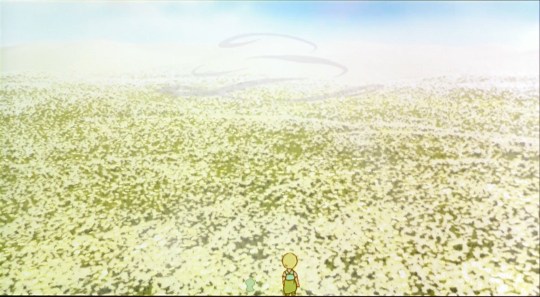
I’m not going to dwell on this too much because I’m going to be going more in detail about it below, but our story starts off in Wallace’s hometown of Summer Memory, a fictional rural village in Colorado, in 1995. (As mentioned earlier, this is a bit of a timeline contradiction; Adventure episode 45 establishes that “the one who wishes for stability” and the Agents didn’t get the idea of human Chosen Children until 1995, whereas the events of Hurricane Touchdown imply he’d been one before then.) Chocomon suddenly vanishes, and a gust of wind is left behind, implying that he must have been kidnapped. It’s not exactly said by what he was taken by (Digimon: The Movie ties it into Our War Game! by having both be traced to a “virus”, but no mention of such is made in the original Japanese version).
The mystery of what it is that took Chocomon away is never fully elaborated in the course of the movie, but as it goes on, it becomes increasingly apparent that it doesn’t actually matter. Why? Well, stay tuned.
So, timeskip to 2002!
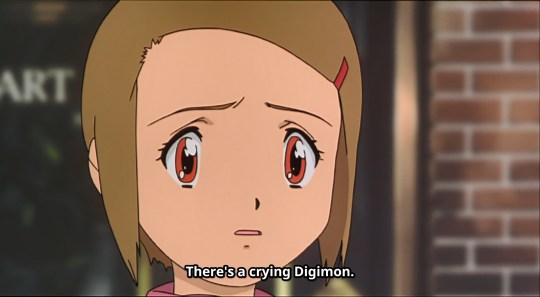
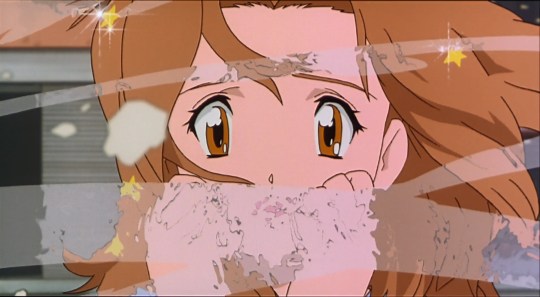

As Takeru and Hikari are visiting Mimi in New York, Hikari, who is known to have a bit of an empathic connection to Digimon, senses that there’s a “crying Digimon” (this will be important later), and Mimi suddenly vanishes – as do the other Chosen Children.
I think part of the reason this movie is often pinned as feeling like an acid trip is that the demeanor and attitude the 02 kids express in this movie feels a little too laid-back for the very urgent situation of their seniors having suddenly up and vanished (which is also not helped by the movie’s overall soundtrack being a lot more laid-back than the events on screen should suggest). This is especially odd because it’s absolutely not like the kids aren’t worried about their seniors at all! Rather to the contrary; “getting Taichi and the others back” is the major motive driving the whole group for the rest of it, and it’s constantly brought up as their goal in dialogue, shaping their actions throughout the rest of the movie. The execution of the dialogue and the overall direction create a bit of a tonal mismatch, but on its face, the actual storytelling checks.
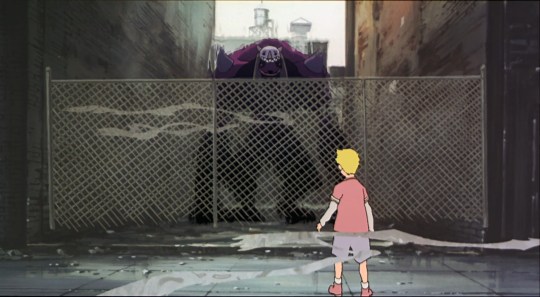
Shortly after, Chocomon – now evolved and corrupted into something – appears, and Wallace and Gumimon confront him.
The fact that Wallace refers to his partners by their Baby-level names (Chocomon and Gumimon) even after they’ve clearly evolved brings up a lot of interesting implications. One is that, not having been privy to any great adventure in the Digital World before, Wallace doesn’t have a lot of awareness of names changing after evolution the same way his Japanese peers do. But another important thing that comes out here is that, through the course of this movie, Wallace primarily sees his partners the same way he did as a young child. A lot of this movie’s story centers around Wallace’s difficulty in moving on from the past and accepting that things aren’t the same way that they are anymore – and so, just like how he has a hard time swallowing that the circumstances have changed, he has difficulty seeing his own partners as having changed, and calls them by the same names despite everything.
Takeru and Hikari catch on, and Hikari’s psychic sense catches on that something’s happened to her brother, too.
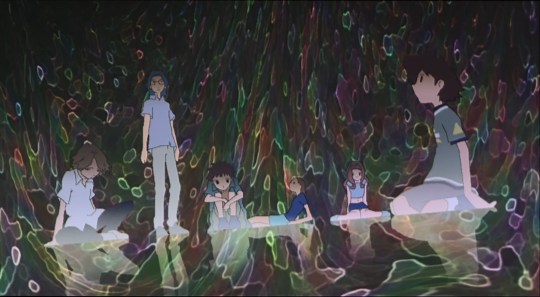
Oh, and incidentally, said seniors aren’t in a pleasant place to be in at all.
The fact that the older kids are clearly Not Having a Good Time in the realm they’ve been kidnapped to – it’s depicted as cold, lonely, full of negative emotions, and eating away at their ability to even bodily function – is very heavily connected to what we later learn about what’s been going on with Chocomon through the last seven years. Moreover, the one truly coherent thing Taichi and Yamato can spit out at this stage is concern for their siblings – i.e., love. Keep that in mind for later!
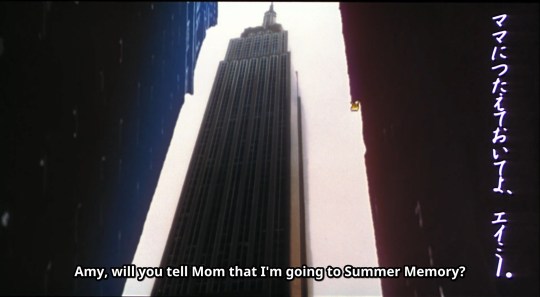
Wallace drops a line to his family (”Amy” presumably being his sister) saying that he’s going to head to Summer Memory, and skips town. Repeat: Summer Memory is in Colorado – he’s doing something as drastic as going out of state to follow Chocomon, which naturally does not amuse his mom very much (as we find out later in the movie). Patamon eavesdrops on the conversation and relays the information to Takeru and Hikari, who contact Daisuke in turn.
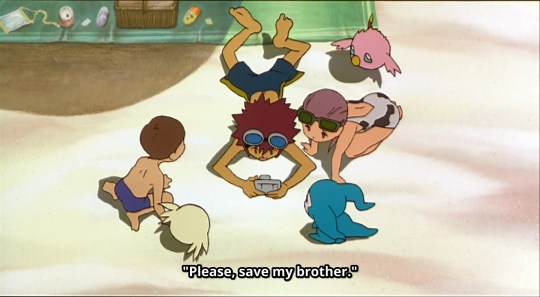
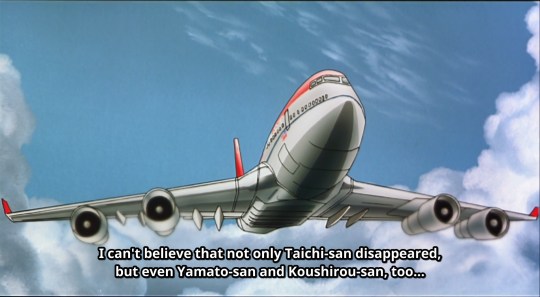
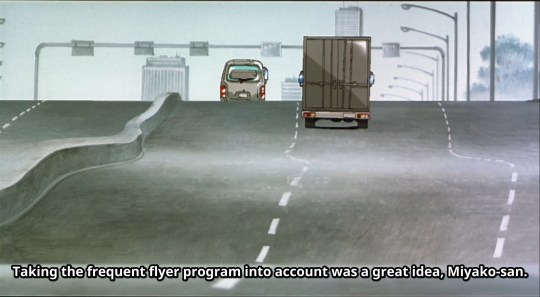
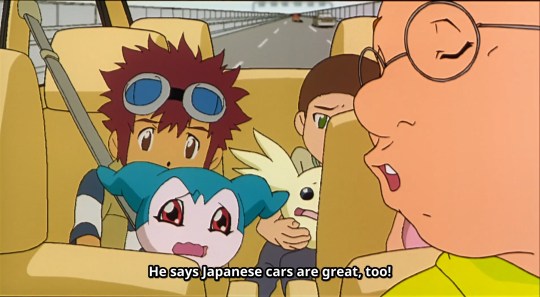
So the remaining three kids nyoom all the way to the US using frequent flyer miles (which makes you really wonder whose those are, or what on earth they told their parents to allow three elementary school kids go around unassisted in another country) to go save their seniors, which apparently doesn’t fund their trip all the way to Colorado, forcing them to hitchhike from New York.
(We also get a quick scene implying that Daisuke has better proficiency in English than Iori and Miyako, as he translates some of the statements for the guy they take a ride from. This is pretty surprising, given that Daisuke hasn’t really been portrayed as particularly book smart…but then again, language skills sometimes just happen to come naturally to some people regardless of skill in books, and hey, it might just come in useful for his future ramen chef career in New York…)
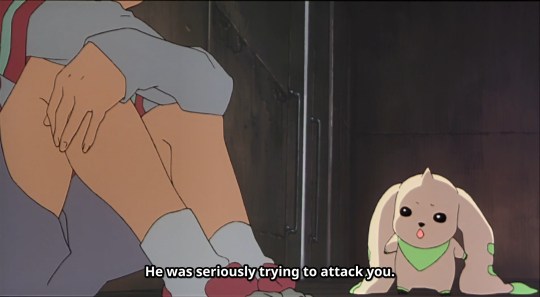
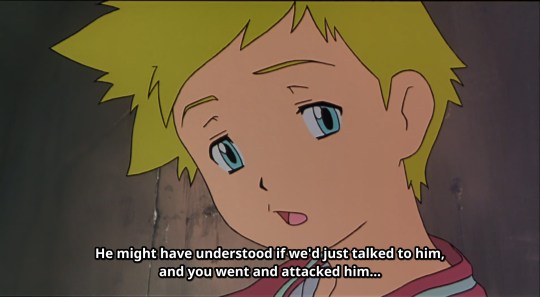
We get our first major scene of dialogue between Gumimon and Wallace, and we learn quite a bit about their characters in the process. Gumimon has a similar laid-back attitude to the more prominent Terriermon in Tamers, but beyond that (and a shared voice actress), it’s important to note that they have very different personalities otherwise. In this scene, Wallace and Gumimon get in an argument over how to handle Chocomon, with Wallace insisting that they shouldn’t have attacked him and that they should have just “talked” about it – even though, as Gumimon correctly points out, he was pretty obviously trying to physically attack Wallace.
In fact, at this part of the story, Wallace is being extremely irrational and in denial. You don’t even have to watch the rest of the movie to see that Gumimon’s very practical stance on the matter is reasonable – Chocomon was very much trying to attack Wallace, and getting caught in the fight was pretty much all he could do for Wallace’s safety. But Wallace, still stuck in the past, can’t accept that at this point in the movie, and, honestly, is being a bit of a brat about it too – he’s engaging in progressively more self-destructive behavior over the course of the movie (ditching his family to set off by himself in order to hitchhike to Colorado, for one). We later find out that Wallace is specifically obsessed with going back to the flower field where he lost Chocomon, having independently come up with the idea that this would somehow let everything go back to what it was before – even though there was really no sign this would actually fix anything.
The Adventure universe generally runs on a concept that a Digimon partner is representative of part of the self, and so, tying that into Wallace and his two partners, it can be taken that Gumimon and Chocomon reflect the duality of Wallace as a character – Chocomon representing his desire to latch onto the past and hope that everything can be the same that it was before, and Gumimon as Wallace’s sense of reason, advising him about the reality of the situation and how to practically get through it (and, thus, to move on). In fact, Gumimon is the one constantly advising him about said self-destructive behavior (reminding him that his mom is probably worried about him, but also berating him for just ditching the train as a result instead of thinking about how that’d leave them without reliable transportation for the rest of it).
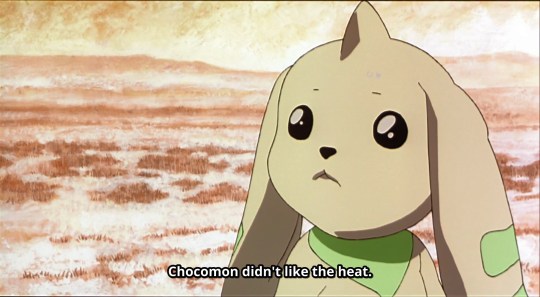
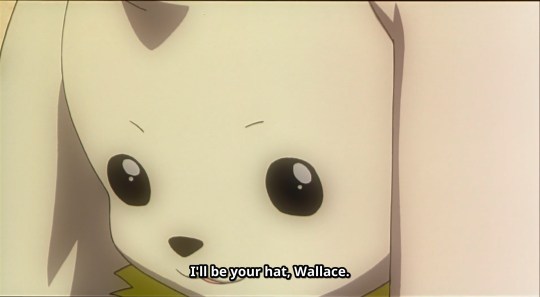
The symbolism is driven in even further when the only thing Gumimon has to say, in response to Wallace clinging further onto the idea that going to the flower field will fix things…is a cryptic statement that Chocomon didn’t like the heat, then suddenly offering to be a hat to provide Wallace shade. Because right now, Wallace and Chocomon are the same: clinging hopelessly to shards of the past.
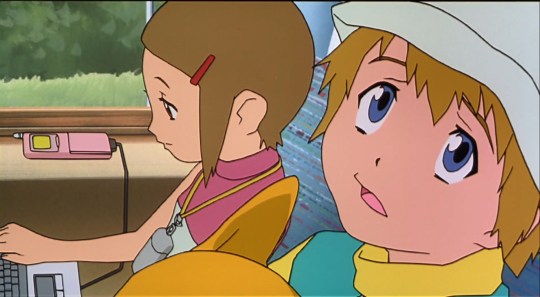
The other 02 kids make their way to meet up in Colorado, but run into some snags when Daisuke, Miyako, and Iori end up missing the exit to Denver (Takeru is not amused), and Hikari and Takeru’s train ends up stranded thanks to Chocomon’s interference…
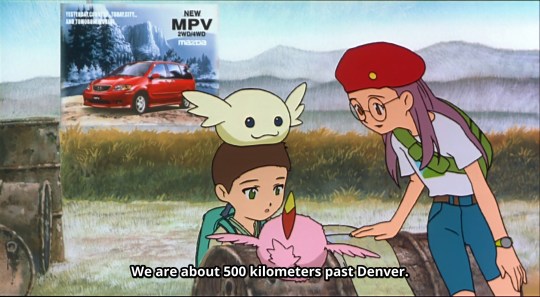
…and, making things worse, Daisuke, Miyako, and Iori try to take a plane back to Denver, only to overshoot it again. (Sorry, Taichi…your juniors are idiots.)
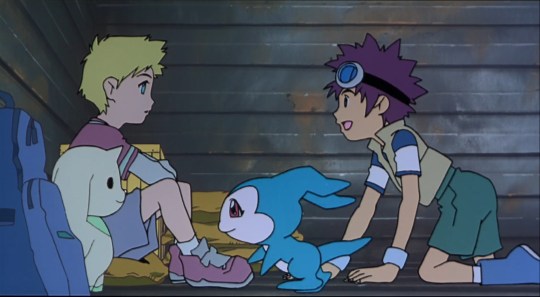
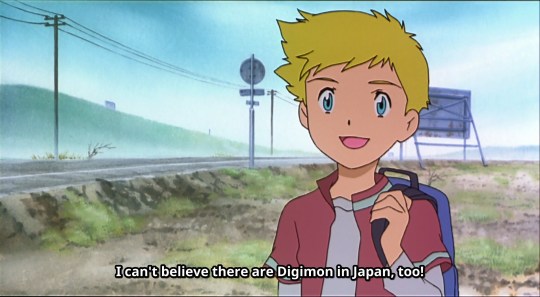
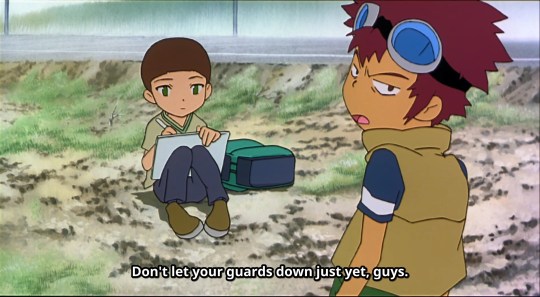
Fortunately, they get lucky by running into the very same boy they’re indirectly looking for on their way to hitchhiking. We learn that Wallace has never had exposure to other Chosen Children before to the extent of knowing there were any Digimon in Japan, nor has he ever been to the Digital World, so for all intents and purposes, his experiences with Chocomon and Gumimon are all he knows (i.e. he has no awareness of large-scale Digital World affairs). He also apparently speaks Japanese, which is convenient for this movie so that they don’t have to have a language barrier, but, amusingly, Wallace claims that it’s because he “had a Japanese girlfriend once”. (Gumimon, who is much more reliable of a source, says that he’d apparently put an honest effort into studying, so an interpretation that Wallace really likes anime or something is not out of the question.)
It’s also interesting to see how the others react to him, especially considering that it’s becoming increasingly apparent that he’s involved with the disappearance of their seniors. Miyako is as openly friendly as she generally always is, Iori presses him very calmly about questions relevant to the disappearances and Chocomon without even batting an eyelid (future lawyer in training here), and Daisuke is suspicious from the get-go…which is exacerbated when Wallace starts flirting with Miyako. The running gag of Daisuke getting angry about Wallace flirting with Miyako has a lot to unpack here – the most obvious standby is the shipping interpretation (or, at least, that Daisuke may be as protective of Miyako as he is Hikari), but there are other points to observe as well. Firstly, Daisuke is a rather abruptly straightforward and overly honest person, and it makes sense that he’d play badly with people who seem dishonest – after all, his suspicions of Wallace started even before he started flirting, and he also shows similar hostility around Takeru (also not a very straightforward person) when he suspects he’s being made fun of. But also, the Pixiv dictionary entry takes the interpretation that Wallace’s personality had gotten a bit “warped” by his experiences – or, in other words, he’d developed this penchant for acting like a flirt, wandering off on his own, and altogether being incredibly wishy-washy because of the trauma of losing Chocomon and his inability to get over it.
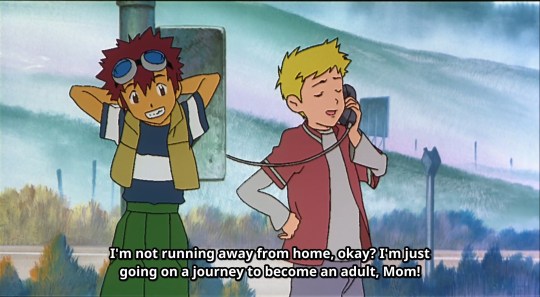
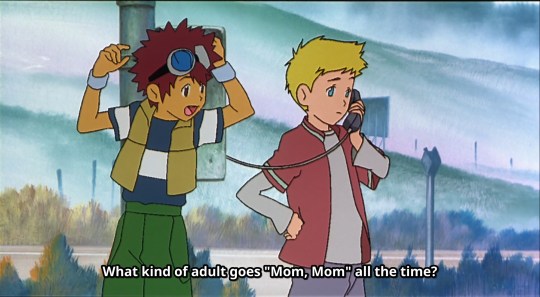
And as much as Daisuke’s being a prick about it (to the point that mocking Wallace for it gets him left there stranded with him), he’s absolutely right about the contradiction Wallace’s posing – he’s acting all high and mighty about trying to become an “adult” (meaning that going off on his own and flirting with girls presumably are part of his perception of what Mature Guys do), yet he’s being a total mama’s boy by constantly dropping everything to call her repeatedly through his trip. (It’s even worse than the subs here suggest; he calls her “mama”, the kind of super-affectionate language used by Mimi and Ken.) As Gumimon says, Wallace thinks he’s actually right, but he doesn’t actually have it together at all.
Another interesting thing to note here is that at this point of the movie, Wallace calls Daisuke “Daisuke-kun” (with honorific attached, slight distance). Remember this for later.
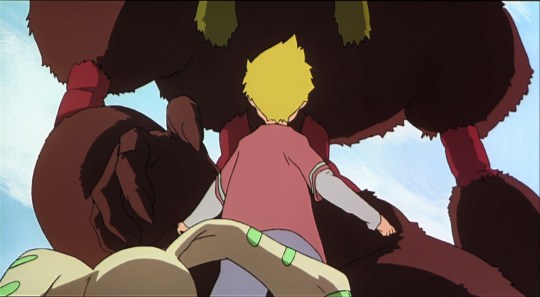
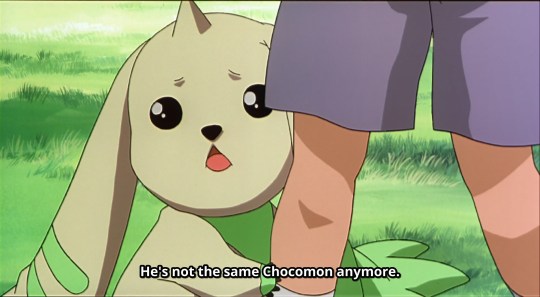
Chocomon appears to confront them again, but he seems to not properly recognize Wallace – because, as we later find out, he doesn’t see the current Wallace as “Wallace”, and will accept nothing less than a younger Wallace from exactly the way he was when they were separated. (It is later stated in the movie that this is why he kidnapped the seniors and turned them younger; since he can’t recognize “Wallace” the way he is now, he’s taking anyone he can find with a Digivice and de-aging them in the hopes that he’ll find “Wallace” among them.) Gumimon recognizes that Chocomon is beyond recognition, and tells Wallace to not see him as Chocomon, but Wallace refuses to accept this and continues to intervene in the fight, telling Chocomon that they’ll meet again in the flower field. Again, Wallace’s mentality isn’t that different from Chocomon’s at this point – he may not be delusional to the point he wants to literally turn back time, but he still thinks that reproducing the conditions of seven years prior will fix everything and make it all better again.
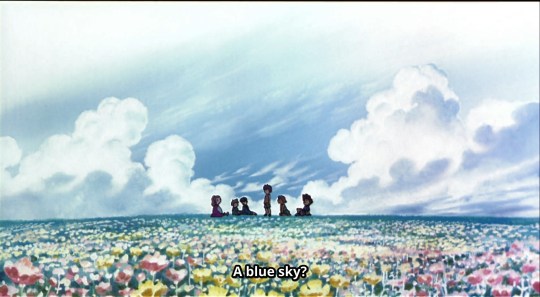
During this whole time, the older(?) kids are getting progressively younger, and it’s turning out to impact not only their physical bodies but also their mentalities. At this point, they’re starting to lose awareness of what’s happening to them, as they become more and more connected to Chocomon’s emotions.
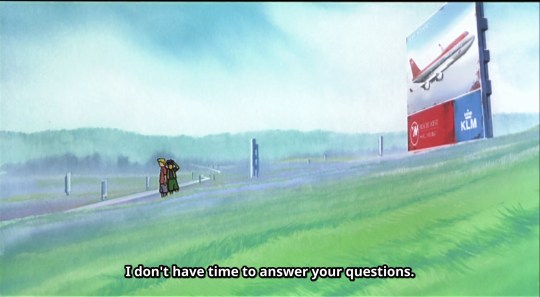
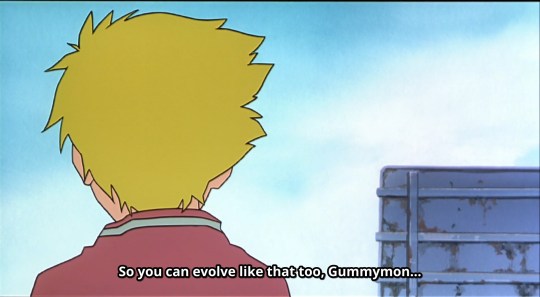
Daisuke is smart enough to catch on that Wallace definitely knows what’s going on, and starts to interrogate him. Recall that Daisuke is completely within his rights to do so at this point – Wallace is not only acting incredibly shady, he’s also being dismissive and refusing to give Daisuke any concrete answers about something that most certainly involves him at this point. As the 02 kids keep reiterating, their seniors have been kidnapped, and it’s pretty clear to anyone that Wallace knows something about this, but he continues to blow them off.
Wallace also doesn’t seem to be very happy about the fact Gumimon had evolved during the battle – remember, Wallace is very resistant to changes in his status quo, and especially when it involves Gumimon evolving in a similar way to Chocomon.
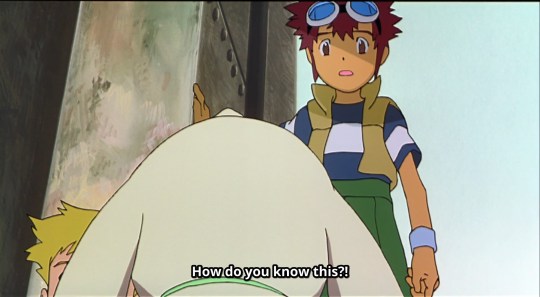
Daisuke continues to pry into what’s going on with Wallace and Chocomon, and Gumimon, who understands that there’s no use in denying that this is a problem, tries to be straightforward about it – but Wallace, still stubbornly refusing to open up about it, won’t even let Gumimon tell Daisuke about the truth.
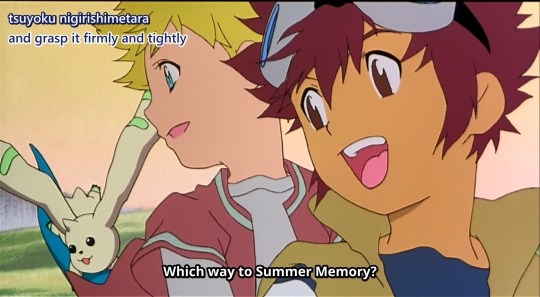
Daisuke realizes that they’re not going to make any territory as it is, so he decides to have Lighdramon take them to Summer Memory for the time being, bonding a bit more with Wallace in the process.
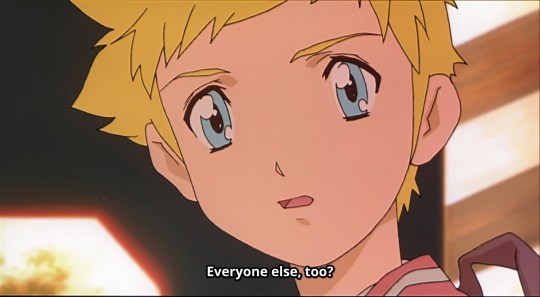
Once they reach Summer Memory, the kids learn about Takeru and Hikari getting stalled by Chocomon on the train, and the fact everyone else on it had disappeared – meaning that the responsibility that Wallace is carrying for not taking care of this problem begins to weigh further on him. Daisuke, Miyako, and Iori continue to interrogate him about what he knows.
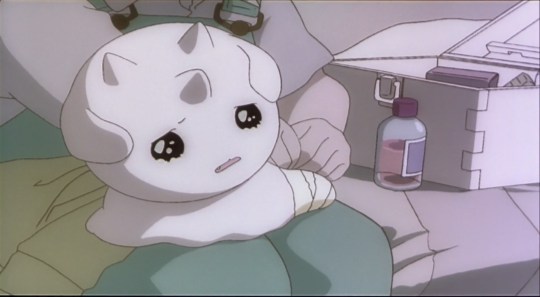
But Wallace, still stubbornly, refuses to talk, and being in Summer Memory only drowns him in further memories of his past with Chocomon and Gumimon. We learn a bit more about Gumimon’s past, too – apparently, he was quite the crybaby…
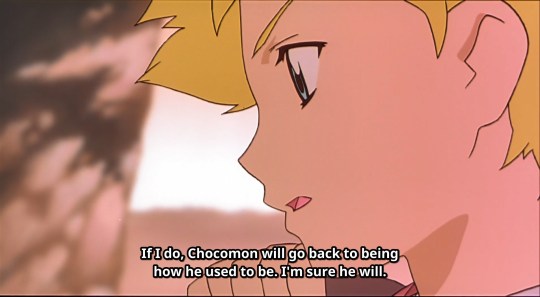
And when Gumimon finally begins to spill the details of what’s going on – that Chocomon wants to see the younger Wallace and is kidnapping kids with his Digivice and turning them younger as a result – Wallace still continues to double down on his denial. Notice his wording – his specific insistence that things will go back to “how they used to be,” because it’s not just about getting Chocomon back, but also a fixation on recreating that happy childhood he had with him.
(There’s also a bit of a cute moment around here where Daisuke asks Wallace if he needs to call his mom – after having teased him for being a mama’s boy earlier, Daisuke really is starting to care about his welfare. It’s also amusingly mentioned that Daisuke, Miyako, and Iori are broke out of money until they meet up with Takeru and Hikari again…)
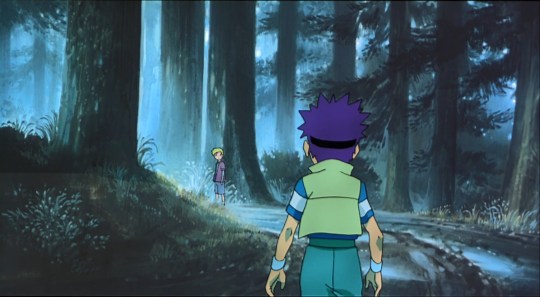
That night, Wallace tries to go off by himself to the flower field, not even bringing Gumimon with him – as he implies later, he doesn’t even want to get Gumimon involved with this because he was the closest to Chocomon – but Daisuke, having finally caught on to his suspicion that Chocomon is not only relevant to Wallace but also Wallace’s partner, confronts him about it. Wallace thus finally spills the details – that Gumimon and Chocomon were born from the same egg, that Wallace kept them from his mother and stuck with them during childhood, and that, seven years prior, Chocomon suddenly vanished while they were playing at the flower field.
Wallace: I’ve never been able to forget about Chocomon since then. Not even after moving to New York, not even once. We were such good friends…So why did Chocomon have to end up like that? Does he hate me for not being able to save him? Daisuke: So the enemy we’re fighting is actually your Digimon? Your most important friend?! Daisuke: Of course you’d never be okay with that…
Daisuke is in shock, even though he’d already started to suspect this.
I said, earlier, that Wallace is being extremely irrational and in denial. I did not say that his feelings aren’t valid. Wallace’s situation sucks, and Daisuke recognizes why this hurts for him so much, especially after putting himself in Wallace’s shoes (and in fact it’s even worse for Wallace; Daisuke’s only known V-mon for less than half a year, whereas Wallace is talking about his formative childhood friend).
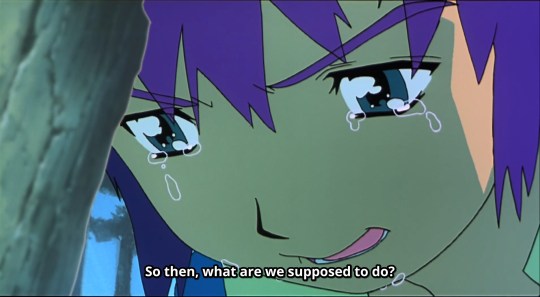
Daisuke: I’d never be able to do it. If V-mon were to turn into something completely different…Even if he went on a horrible rampage…There’s no way I’d ever be able to bring V-mon down. Wallace: Daisuke… Daisuke: So then, what are we supposed to do? Wallace: It’s not something you need to be crying over. Daisuke: But…
This entire scene is an interesting one for many reasons, especially because of the position in which it aired – this was in the middle of the arc in 02 when everyone was getting their second Digimentals. Daisuke had, only a few episodes prior, expressed trepidation over “friendly fire” – fighting any friend who had become controlled by the Digimon Kaiser. This is consistent with that (and the 02 kids’ general bleeding hearts and difficulty with fighting friends), and it’s even worse – unlike before, when we were talking about evil mind control, Chocomon is pretty obviously a victim of his own madness. And although Wallace continues to insist that this isn’t Daisuke’s problem, Daisuke, for all he’s rough around the edges, is a genuinely kind person who thinks of others to the point he breaks down in genuine tears over the problem, and it’s consistent with not only his prior characterization of thinking about others’ feelings in 02 episode 8, but also how this eventually ties into his indignation over seeing others being hurt (episode 20) or their feelings being trampled on (episode 49).
Another interesting thing here is that at no point in the movie is “killing” ever brought up, but rather the word used is taosu, which literally means “defeat”. In 02 proper, its use is somewhat euphemistic – most famously, it was used in episode 44, when Miyako and Hawkmon have a crisis over killing LadyDevimon (so in short, there’s no illusions about the fact killing is in play here). But in this context, it’s not even really about killing. Wallace doesn’t even want to fight in the first place. The sheer action of physically beating up a beloved friend is painful, with killing as the ultimate unwanted outcome. Everything about this sucks. But Daisuke correctly points out that Taichi and the others’ welfare is on the line here, and everything feels like the wrong thing to do. “What are we supposed to do?”, indeed.
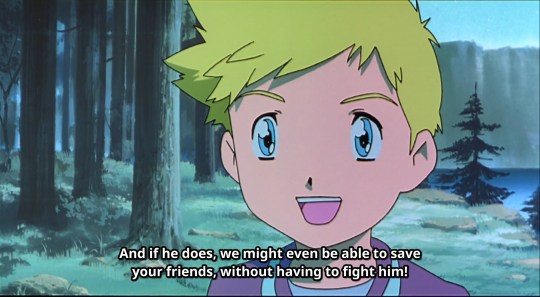
So that’s why Daisuke momentarily indulges in Wallace’s denial-induced pattern of thought, because it really does seem like the only out here. (Especially because, from Daisuke’s perspective, Wallace seems to understands this situation better than he does – even if he doesn’t actually.) If they go to the flower field, they won’t have to fight and everyone will be saved and it’ll be fine! Wallace is irrational and in denial, but you can’t blame him and Daisuke for really, really wanting to believe this.
And Daisuke drops this zinger of a line, too:
Daisuke: So don’t say you’re gonna go alone.
Daisuke’s characterization really is important here, because, again, this movie came out during the first arc of the series, before episode 21 and the second half that centered around Ichijouji Ken’s redemption. At this point in the series, Daisuke was still being extremely deferential to others, especially his seniors, in almost all cases, and although episode 8 was a momentary glimpse into the kind of resolve Daisuke could have when it involved something he really cared about, this movie is really the first major sneak peek into how supportive of a person Daisuke is going to develop into, especially when it comes to Ken.
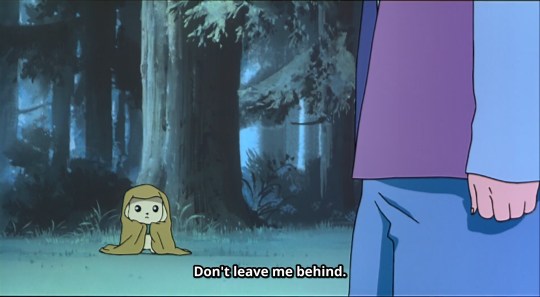
And Gumimon reaffirms that he’s going to stick by Wallace no matter what – filling the traditional role of a partner that Chocomon won’t anymore.
So they go to the flower field, and everything…fails spectacularly.
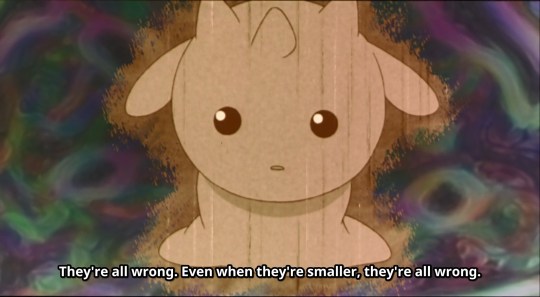
Well, before that, we get a glimpse of how the older kids are doing (they’re barely even conscious now), and we finally get to see Chocomon “in his element” and not as a rampaging monster. Things really, really aren’t going great for Chocomon either. He desperately and sadly jumps among the kids, trying to find Wallace among them, and what he really, really wants is just to be with his partner again. But they’re all “wrong”…
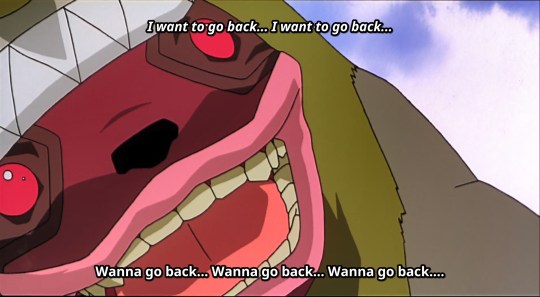
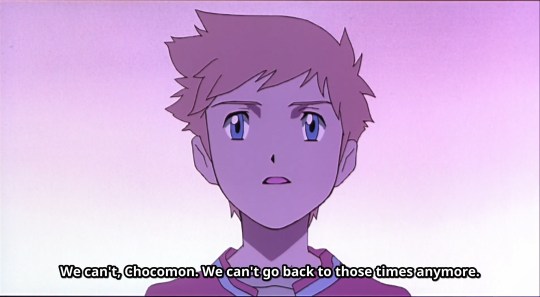
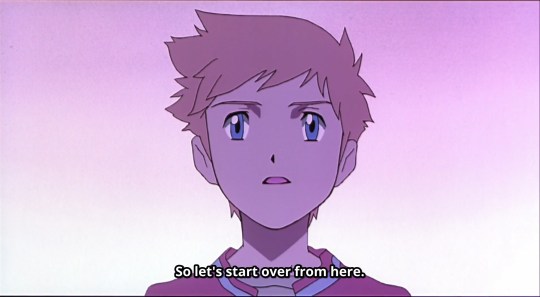
At first it seems like Wallace is making headway – for a second, Chocomon even recognizes him as Wallace! – but he continues to insist that he wants Wallace to come “with him”, to where it’s “cold and lonely and no one is there”. The way he starts chanting that he wants to go back is represented by the young Chocomon’s voice getting progressively lost in the monster’s voice, and Wallace, starting to grasp how futile Chocomon’s clinging to the past is, makes his first statement of the movie’s core theme: you can’t go back to the past, the only thing you can do is look forward and think about what you can do from there.
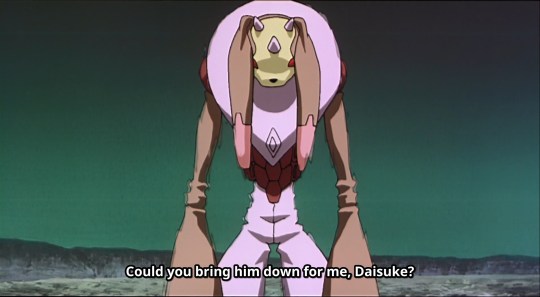
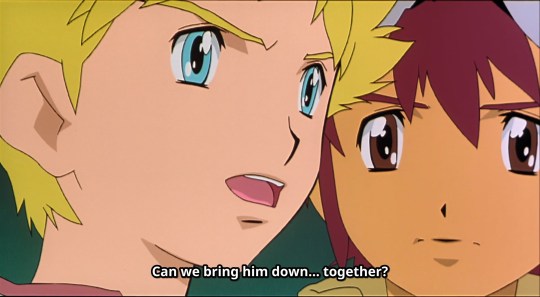
So after witnessing very clearly, in front of his eyes, how Chocomon is not going to listen to reason and will accept nothing less than something he can’t have, to the point of evolving and distorting everything around him, Wallace’s denial finally hits its limits, and he accepts that fighting him will be the only option out. (Again, note the use of “defeat” here – it’s not really about beelining straight to euthanizing him as much as Wallace has finally gotten over his refusal to fight Chocomon at all.) And considering that the situation is clearly rapidly escalating, and that Chocomon himself is clearly not in sound mind and having a terrible time himself, it doesn’t take much to see why the bleeding-heart Daisuke would also end up conceding so quickly. There’s a limit to how much you can hold out with pacifism when that just happened right in front of you!
(Also, Wallace no longer uses the honorific on Daisuke. Friendship level up!)
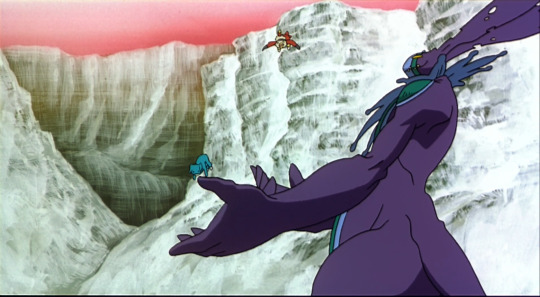
Chocomon evolves further and further, and his personality starts to actually take a turn for the cruel as he starts toying with the Digimon. In fact, it’s made pretty apparent that they’re no match for him from the get-go – he keeps toying with reality and forcing the Digimon back and forth between forms. He ends up “altering the world” into something reflective of his own heart, and it’s repeatedly pointed out that it’s “cold and lonely” – in short, Chocomon is subjecting the world to feel the same pain and loneliness that he felt, the pain that was enough to drive him mad.
And Wallace finally has this to say:
Wallace: Like Daisuke said, I’m a big baby. But you’re not Chocomon anymore. No, you’re the one who did this to Chocomon…Chocomon was all by himself and lonely, and in that loneliness, he tried so hard…But you took his heart and locked it away somewhere! I’m going to fight. If I defeat you…If that means I can free Chocomon from you…Then I want to fight, too! I need strength…
Firstly, Wallace acknowledges that he’s been a brat – that he’s been philandering around and acting spoiled and stringing everyone around (character development!!). And secondly, Wallace finally acknowledges the truth of Chocomon no longer being recognizable anymore. The ending quarter of this movie focuses heavily on the idea that Chocomon has now become so distorted that he can no longer even be considered the same thing anymore – it’s ambiguous as to whether that “you” that Wallace refers to having taken Chocomon away is actually a separate supernatural entity, or whether Chocomon was drowning in his own loneliness to the point those negative feelings became their own entity and consumed him.
In actuality, though – it doesn’t really matter! 02 as a series would also go on to blur the boundaries between external interference and internal forces – Ken having the Dark Seed as an influence but also being personally responsible for his own emotions driving him over the edge, and having to take responsibility regardless, and Oikawa technically being possessed by Vamdemon but still being goaded on by his own fixation with the past (in fact, notice how all three of these cases have to do with a fixation on things that can’t be brought back). Right now, the only thing that matters is that Chocomon is no longer recognizable, the thing in front of Wallace is no longer the same friend he knew, and even being able to bring back Chocomon’s sense of self is something Wallace wants.
(Daisuke also throws in a more charitable interpretation of Wallace’s actions even when he’s being hard on himself, pointing out that he can’t really be called a “baby” when he also did have genuine determination to come all the way there to find Chocomon despite his age.)
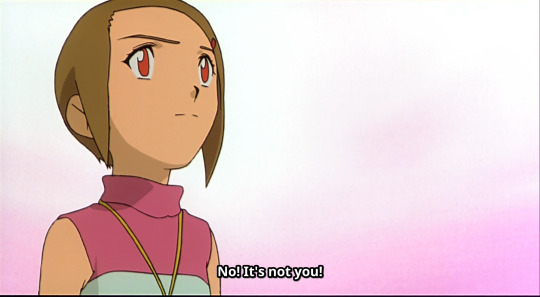
Hikari and Takeru arrive on the scene, and after Daisuke loses his marbles a bit over his happiness at seeing Hikari-chan there, Hikari points out the same thing: “You’re not the Digimon that was crying.”
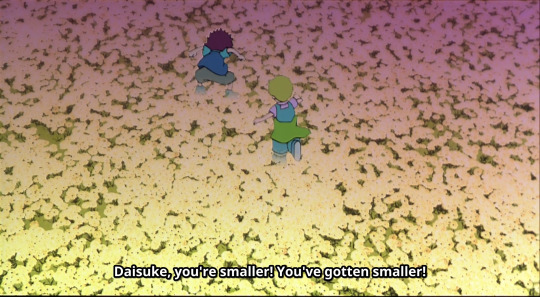
Chocomon starts turning the 02 kids younger too – and remember, it was established earlier that he was using the Digivice as a guide. That meant it made sense for him to target the older kids, since they had the same model of Digivice Wallace did. But Daisuke and the others have D-3s, and there’s no way to really mistake them for Wallace – so in other words, Chocomon has devolved to inflicting cruelty for no good reason, with the original motive having completely vanished.
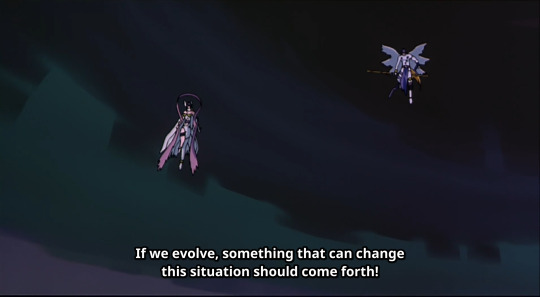
In increasing desperation, Angewomon and Angemon decide to evolve, and…look, I don’t have an explanation either, but I have to admit I’m somewhat amused by the fact that even they don’t really seem to have an explanation beyond “well, we’re desperate and hopefully it’ll do something!”
So they evolve, and Chocomon oneshots them. But that’s okay, because they released some golden Digimentals for Daisuke and Wallace to use! So V-mon and Gumimon get shiny new golden forms –
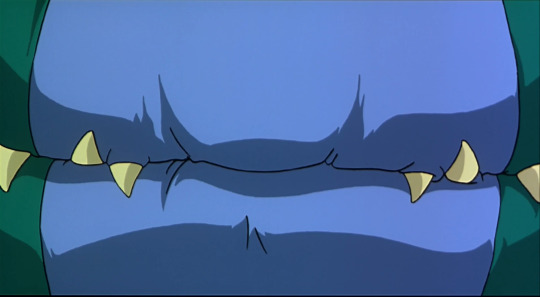

– and Chocomon pretty much oneshots them, too. More specifically, he eats them…and within his body, Magnamon and Gumimon’s consciousness gets eaten apart to the point they start forgetting their partners. Wow, this situation just got worse.
Yeah, so, despite the movie being named after the golden Digimentals, the actual point being here is that power means absolutely nothing in this situation. Remember, I pointed out that even from the beginning Chocomon was straight-out warping reality – they really didn’t have a chance.
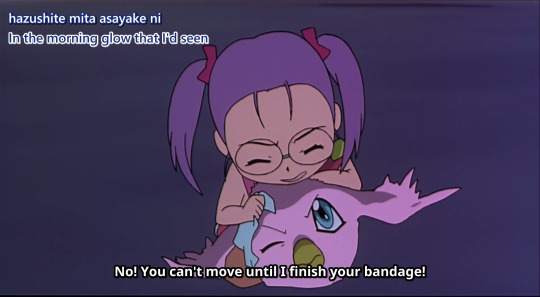
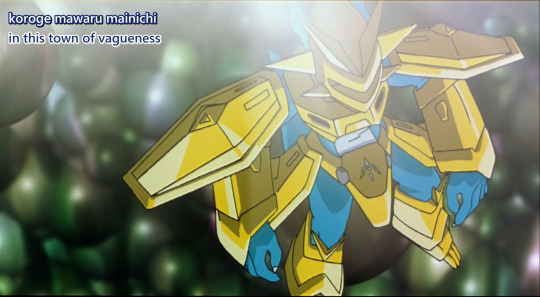
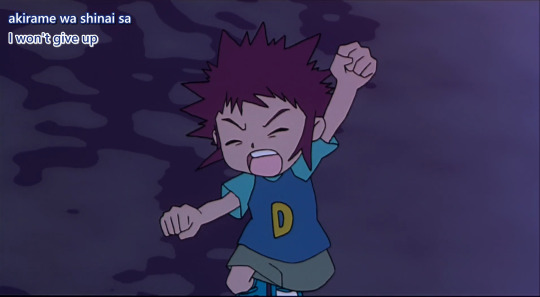
So basically, everything devolves into complete chaos. Everyone’s being turned into little kids, with the mentality to match. All the Digimon are being oneshotted and being tossed around like tissues. But the one constant through all of this is that the kids are constantly running after their partners.
Remember how, back when the older kids were first getting sucked into Chocomon’s world, the one thing that seemed to remain intact at first was “love”? That “love” is what reaches out to Magnamon and Gumimon inside Chocomon, and makes them remember their partners again.
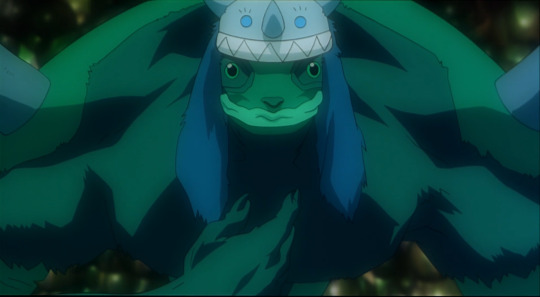
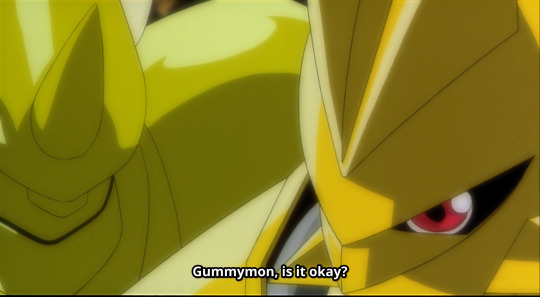
And, more importantly, that “love” is what awakens Chocomon – the real Chocomon – inside his consciousness, and he wordlessly makes a gesture begging Magnamon and Gumimon to kill him. And so they do – with understanding and consent from all three involved.
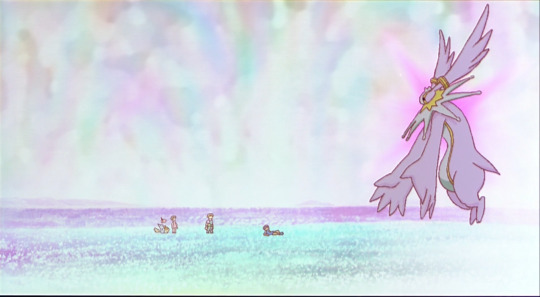
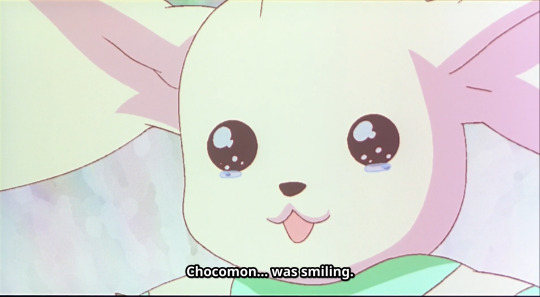
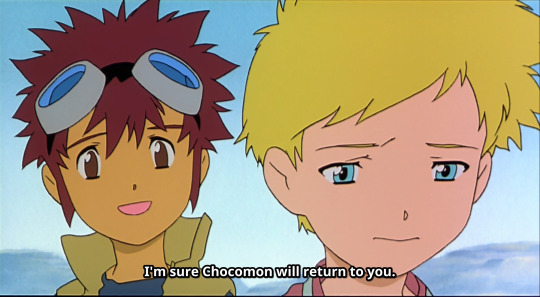
So in the end, the most extreme conclusion was reached. Chocomon died, at the hands of Daisuke and Wallace’s partners. But in that moment before he died, Chocomon’s pain was relieved, and he was himself again – Gumimon says that “Chocomon was smiling”, even in spite of his usual personality being that of a crybaby. They may have failed in their struggle to prevent the inevitable conclusion of having to kill Chocomon, but they did, to some degree, “save” him – so all of it did mean something in the end. And Daisuke promises that this still doesn’t mean the end of everything – they may have not been able to bring back Chocomon, and especially not in the exact way that would make things “the way they were before”, but the future is still there for him to return someday.

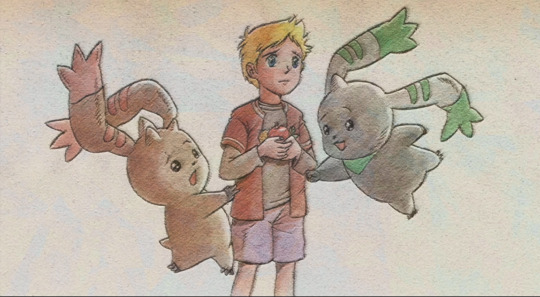
So, we clean up loose ends. Taichi and the others are returned safely, and in the end, Wallace decides to still be a vagrant for a bit longer – and to flirt with Hikari and Miyako a bit before he leaves. In the end, Wallace still has a long way to go if he wants to really grow as a person. But as Miyako points out, he’s gotten a bit bolder than he was before – and he’s greeted with an egg in the end, as if opening up new possibilities.
The Door to Summer contradicts the finding of this egg, or at least opens up the possibility that this wasn’t actually Chocomon’s, so it’s ambiguous as to whether the frame of Terriermon and Lopmon at the end of the credits is meant to be taken literally, or if it’s just symbolic. But even in the case of the latter, Chocomon is seen as Lopmon, a form he never got to have in Wallace’s childhood – so, in the end, it’s about different possibilities opening up in the future, rather than replicating that of the past.
All right, let’s recap this movie for those doing a tl;dr! Or, more specifically, let’s recap the events in chronological order:
Sometime before 1995, an egg emerges from Wallace’s mother’s computer, and hatches into twin Digimon, Chocomon and Gumimon.
In 1995, while playing in a flower field in Summer Memory with Wallace and Gumimon, Chocomon disappears for unknown reasons.
For the next seven years, Chocomon is trapped in delirium, full of loneliness and pain from being unable to see Wallace, and starts to become obsessed with the idea of reuniting with him, but, in his madness, accepts only a version of that reunion that involves him being the same young child he was when they parted, as if nothing had changed since.
Wallace, likewise, develops a fixation with getting Chocomon back so that things can be like “the way they were before”, even after moving to New York.
In 2002, Chocomon begins to kidnap kids with the same model of Digivice that Wallace has, and starts to forcibly turn them younger and send them into delirium like his own, hoping that this will bring the “Wallace” he wants back. Wallace starts to chase after him and decides that returning to the flower field in Summer Memory will allow him to communicate with Chocomon and make him go back to the way he was before.
Takeru and Hikari, hoping to find a lead on their seniors’ disappearance, drop a line to Daisuke, Miyako, and Iori, who head to the United States, also hoping to find a lead in Summer Memory. On the way, they run into Wallace, who is evasive about his connection to Chocomon and the kidnapping incidents.
At Summer Memory, Daisuke confronts Wallace and learns about his story, emphasizing deeply with the difficulty in killing an important friend, and agreeing that they should reach out to Chocomon at the flower field.
Chocomon continues to fall deeper into madness at the flower field, and Wallace and the others realize that they have no choice but to fight him. As Chocomon becomes so distorted he’s no longer recognizable, Wallace declares an intent to at least save his consciousness.
As the fight carries on, the kids are de-aged by Chocomon in his madness, and Magnamon (V-mon) and Gumimon are swallowed by Chocomon. However, the kids’ love for their partners awakens Chocomon’s consciousness again, and he asks Magnamon and Gumimon to end his pain.
With everything settled, Wallace and Gumimon are able to face forward into the future in the hopes of meeting Chocomon again and starting anew from scratch.
The Door to Summer
Actually, there’s not much to really be said about Hurricane Touchdown’s spiritual sequel The Door to Summer, except that it revisits similar territory to the movie, observing it more in Daisuke’s context than it does Wallace’s. (The story is very much more Daisuke’s than it is Wallace or Mimi’s.) The short synopsis is that Daisuke, having had a pretty bad time recently, finds himself in contact with a mysterious “winter” (in the middle of summer!) that seems to reflect his own heart…and a mysterious amnesiac girl whom Mimi names Onpu “Nat-chan”, who immediately latches onto Daisuke. In the end, “Nat-chan” turns out to be “a Digimon who’s taken in a lot of evil data,” who goes on a rampage and forces the others to fight and eventually kill her.
Although the reason for Nat-chan going on a rampage is more concrete than what was given in Hurricane Touchdown (it’s portrayed as “data chips” that seem like fireflies), The Door to Summer also makes it very clear that it wasn’t just supernatural influence, but also Nat-chan’s loneliness, desire for a human partner, and jealousy of Daisuke and V-mon’s relationship. Daisuke, while showing immense hesitation about fighting her when she had befriended them, still manages to “save” her in some way, to the point she actually verbally thanks him as she dies. And in the end, Daisuke and the others decide to take her egg and find a partner for her – even if she can’t be Daisuke’s partner like she wanted, she can still start anew with someone else.
Wallace in Kizuna
Warning: The rest of this post contains spoilers for Kizuna.
As said before, Hurricane Touchdown has been said to be the favorite Digimon movie of the director of Kizuna – and certainly, while Kizuna references all four Adventure-series theatrical movies, Hurricane Touchdown’s references are the least subtle, with the plot point of de-aging kids lifted directly from it. (Except, in this case, it’s in the context of trapping oneself in blissful memories rather than being portrayed as the upfront listless torture it is in Hurricane Touchdown.) Moreover, the theme of warning against being fixated on the past is just as present in Kizuna as it was in Hurricane Touchdown, especially when Kizuna’s main antagonist (Menoa) also falls victim to something that’s part supernatural influence and part getting swallowed by her own negative feelings…so it’s only fitting that Wallace himself makes a cameo in the movie. Two cameos, in fact.


The fact that Wallace is established as canonically existing within the Adventure main timeline has thrown a lot of people for a loop, especially since recent franchise events have made it questionable as to how it’s possible for canon to even make sense anymore because consistency has just gone out the window, but the Pixiv dictionary’s chosen rationalization for this is that, at the very least, “(some version of) Wallace exists in the timeline of the main story”. I’m inclined to agree with this evaluation; the fact that people around the globe can agree that the movie is questionably canonical but can’t even agree on how, and the fact that certain franchise entries considered canon (Tag Tamers) have their own contradictions, plus the fact that it’s not like Hurricane Touchdown takes a complete knife to timeline and lore common sense and more that it has some contradictory minutiae that are really easy to sidestep, it’s not actually that hard to say that some timeline of events that reasonably resembled Hurricane Touchdown (with maybe only some minor timeline or evolution differences) happened during the summer of 2002, and thus that Wallace exists.
Assuming that the story of our canonical Wallace is mostly the same or similar to that of the story presented in Hurricane Touchdown, Kizuna provides us with quite a bit of interesting information. We’re treated to two shots relevant to him: one in the form of his name at the top of Koushirou’s list of kidnapping victims, and one where he appears in person at the very end. It’s hard to miss him; he’s wearing similar colors to the clothes he wore in Hurricane Touchdown so you can identify him even at a distance, and he’s also the only loser around here with two partners. That’s right, two! Two!! Chocomon is back – and as Lopmon, exactly like the end credits card of Hurricane Touchdown depicted him!
So it looks like that, one way or another (after Hurricane Touchdown, after The Door to Summer, whatever, make up your own story), Wallace did manage to reunite with Chocomon and start a new life with him. It looks like not all of his habits have died – he’s depicted in a place with palm trees, meaning he’s definitely not in New York or Colorado, so either he’s moved again, is still maintaining the vagrant lifestyle, or just happens to be on vacation.
The other interesting thing here is that Wallace is depicted as one of the Eosmon kidnapping victims. According to Menoa, kidnapping victims were ones who were entertaining thoughts of wanting to go back to the past and remain a child forever – something that should intuitively be against everything Wallace learned in Hurricane Touchdown. But it’s important to point out that Eosmon’s lure is depicted as working on a subconscious level – certainly, if the kidnapping victims in Kizuna were to be outright asked if they wanted to be kidnapped and de-aged and trapped in their childhoods forever, most of them would probably say “no!”, and Wallace is likely no exception! But even if he’s starting his life anew with Chocomon now, it’s not hard to believe that there would still be lingering subconscious regrets about everything he’d lost with Chocomon and the childhood they could never spend together, ones that Eosmon’s allure would end up connecting with, even if the events of Hurricane Touchdown had consciously taught him better. Alas, being a human is hard.
#digimon#digimon adventure 02#hurricane touchdown#shihameta#digimon adventure last evolution kizuna#kizuna spoilers
125 notes
·
View notes
Text
Binge-Watching: Pokemon Johto Journeys, Episodes 19-21
In which we get a lot of little diversions that all leave a big impact.
Ash Has Two Shoulders
If you were to ask me, the Pokemon anime is at its best when it’s showing me things I haven’t seen before. Sure, it’s a long, sidetracky adventure that takes forever to have any sort of story progression, but as long as those sidetracks are constantly exploring new concepts within the world of Pokemon, I consider it a fair investment. This universe is so vast and full of possibility that there’s joy to be found in simply experiencing all its countless idiosyncratic touches. This chunk of episodes is a prime showcase of that potential. Nothing happens here in terms of big plot or character stuff, but there are so many fun little moments and details along the way that I haven’t seen from Pokemon before, so it still feels like this adventure is taking me to new and exciting places. I’m always a slut for sequences where only Pokemon are on screen telling a story just through strong character acting, so the whole subplot about Chikorita storming off in a huff and accidentally earning the undying loyalty of a gang of street-tough Fighting types was pure gold. Just the image of these big, burly Machokes and Primapes bowing to such an adorable little leaf critter was worth building an episode around all on its own. And then those Fighting types get to kick Team Rocket’s ass just minutes later, as if the whole situation wasn’t hilarious enough. Honestly, this show is shockingly good at taking these kinds of scenarios and running all the way with them. That’s the mark of some damn good episodic storytelling.
And the hits just keep coming across these episodes. We got Nurse Joy in glasses! Ash gets to be a badass and knock Team Rocket’s trash robot out of commission all by himself! We get this neat concept of using Hoppip to help read the weather, and this adorable Oddish who wants to be a Hoppip gets a whole mini character arc about learning to accept his own unique strengths! Plus, cool bits of characterization like the Oddish using his grass hair as an extra limb to hold his friends in place and climb over fences! Team Rocket getting even more hilariously meta than usual (“Just once, I’d like to make a dramatic exit that didn’t involve a life-threatening explosion.”)! Hell, the Chikorita episode is kinda sorta a kid-friendly introduction to the concept of couples’ therapy and talking to medical professionals to help sort out your emotional problems, and it ends on this really cute moment where Ash re-affirms Chikorita’s place on the team by offering her a place on his shoulder alongside Pikachu to show her how much he cares, and seriously how does this show consistently write a more compelling quasi-harem with fuzzy animals than most actual harems write with flesh-and-blood people? The fact that Pokemon is still able to surprise me this many episodes in, that it’s still able to show me things I haven’t seen before, is honestly kind of remarkable. No wonder this franchise ended up taking over the world.
Best of Team Rocket
-”It would be like winning the instant lottery, only for noodles!”
-”This one just doesn’t want to win badly enough! You can tell by the look in its eye.” Huh, maybe James should be a Pokemon breeder.
-”That button just ran into my paw!”
-Oh my god they seriously just wanted the noodles lkhjakashakjsdha
-”Don’t turn the other cheek, Arbok!”
-”Toodles, noodles!”
-”Thank you, I’ve been working on my evil inflections lately.”
-”Unfortunately, the two of us are at a lower altitude.”
-”That... actually makes a lot of sense. You traitor!” sdkfjhsdfk help
-”But what happens when the breeze dies down and drops the Hoppip ten miles from their destination?” Okay, something about the way James’ VA performs this line made it ten times funnier.
-”We’d never do anything honest!” “We could still cheat on our taxes, couldn’t we?”
-”Maybe if we changed the “blasting off” part of the motto, we wouldn’t blast off so much.”
-”We seem to be flying more than the Hoppip recently.” I know, it’s like you’re trying to set a new record for most blast-offs in a single episode.
Odds and Ends
-”I usually have a very dry sense of humor, but not today!” Lol, nice save.
-”Looks tiring.” Booooooooo. Booooooooooooooooo.
-We’ve been getting an unusually large number of “Team Rocket helps our heroes” episodes lately. Not that I’m complaining, of course.
-”I bet he’s using steroids on that Sunflora!” ...you know what, I don’t even wanna ask how that would work.
-Ah, I knew that Snubbul was coming back. Poor rich lady, she must be so worried.
-Man, Solarbeam is such a cool attack.
-Okay, framing that battle through steel pipes was a nice touch.
-Lol, I’ve never seen anyone leave a Pokemon match because their mom called them to dinner before.
-I am growing increasingly concerned with Professor Oak’s relationship to Ash’s Muk. What unsavory things do they do when the cameras are off? Inquiring minds want to know!
-”There’s a new Pokemon called Therapy?” pfft
-”One mental case at a time, please.” ffs Misty you can’t just murder a man like that
-”Good thing I didn’t lose my head chasing you, or you wouldn’t have had a place to land on.” Alright, she’s cute.
-”It’ll take more than you windbags to blow them away!” “Well, then, prepare to meet our biggest fan!” Man, I love when the dubbers have fun with the script.
-Jesus, I wasn’t expecting an actual tornado. This session is nuts, dude.
And on we merrily go. See you next time!
#anime#the anime binge-watcher#tabw#pokemon#pokemon gen2#ash ketchum#misty pokemon#brock pokemon#team rocket#meowth
4 notes
·
View notes
Text
Bob’s Burgers most reliable holiday provides another lowkey enjoyable, but messy episode. Whereas the latest Simpsons strikes a really sore vocal node.
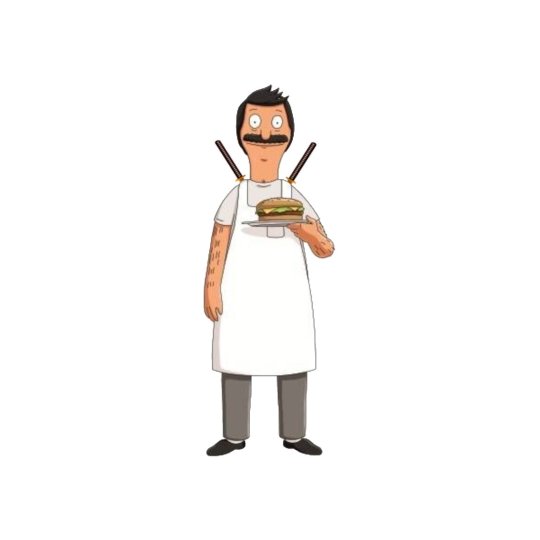
The second holiday episode of Bob’s Burgers’ 11th season, much like the previous Halloween episode, this one also fails to live up to the series’ even higher Thanksgiving standard
That’s not to say “Diarrhea of a Poopy Kid” is not a good episode, but it does fall into the category of Bob’s Burgers episode I typically respond to the least: Character-based storytelling vignettes. The writing on these segment driven episodes tend to be looser and playful bending the show’s reality, but much like every time the other Fox family leaves the Springfield plane of reality into a pastiche styled playground for the writers to plug the characters into.
The overall animation and visual-based gags on this episode offers some of the best moments of the season and series in general. Having the Belcher stories revolve around action movie pastiches of 90’s action movie schlock like Air Force Once, Armageddon, and late 80’s Predator are extremely punny and really grasping hard for satire. The walk to Louise’s Breadator is succinct and makes total sense for Louise’s character to tell this kind of story, whereas Tina drawing inspiration from Air Force One for her story sags the episode down. This episode also has the gall to bring in Gayle, a character that usually elevates all of her episodes nothing much to do until the third and best segment told by Bob. Teddie is also frustratingly nowhere to be seen and Teddie is one of those characters that really only needs a small scene explaining away his absence like in the episode “Gayle Makin’ Bob Sled,” which Variety and I consider to be among the best of Bob’s Thanksgiving episodes.
Nitpicks and reminiscing on past glories aside, what’s most impressive about an episode as conceptual and overstuffed as this one, an episode that’s also poopy and gross-out from the very beginning, still manages to pack undeniable heart. Seeing a character as relatable and sad sack-y as Bob Belcher be passionate about his one favorite holiday reminds me of the everlasting and evergreen Ray Bradbury remark about how everyone is capable of writing poetry as long as you ask them to talk about something they are truly passionate about. Seeing how this episode climax revolves around Gene and Bob’s love of food and proves a powerful sentimental moment. Bob’s Burgers sentimentality works because the show’s core is silly absurdism, light and fluffy gross out gags and quirky twee-ness. Introducing the action movie element feels like the series trying to branch out its audience and try to catch some eyeballs of viewers looking for something more like Archer, American Dad, Rick and Morty, or even Treehouse of Horror style genre exercises. Bob’s Burgers and action comedy feels like putting garlic pesto on cinnamon toast, but Ryan Reynolds doesn’t think so.
Yes, that’s right. The biggest news out of the Bob’s Burgers camp…probably ever…is that the Molyneux sisters, the writers of this very action packed episode, have been hand selected by Mr. Detective “VanWilder” Pickachu himself to be head writers on the upcoming third Deadpool movie. Seeing that we live in a post Russo brothers world and how Dan Harmon was conscripted to punch up Doctor Strange scripts none of this should really surprise me, but I am still very much surprised by this development. The Deadpool 3 creative team and Reynolds is still promising to deliver an R-Rated Comedy, a rating and promise that is very much why Deadpool is the sensation that it is.
In the current media landscape the only way a big budget R-Rated comedy can get made is if it’s attached to something like a mega superhero sized brand. At this point in time Deadpool is the closest thing kids have to a Mel or Al Brooks and it is what it is. If anything Ryan Reynolds personally choosing the Molyneux sisters for a project like this makes me like Ryan Reynolds a little bit more. And he’s a man I previously had no real feelings or opinions about. The only other thing about Deadpool I know about is that the franchise has developed a particularly shitty reputation in terms of its treatment of main female characters and literally freezing them out of the plot. The future of comedy is being driven by the significant increase of women gaining these kind of writing gigs and it’s a beautiful thing to finally see witness. Especially when a company like Netflix has been really shitty to both of its own female driven comedies: Glow and Tucca and Bertie.
Sigh. I am thankful for all the sad little boys and girls wearing too much or maybe the right amount of eye shadow that will inherit this flaming Earth.
Three and half pear shaped pals out of an Oedipus Rex Complex.
////
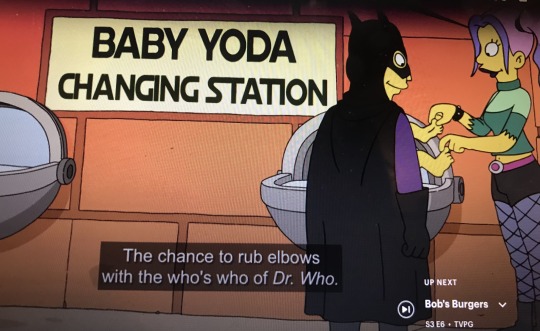
Nerds! Nothing but a lousy rotten sniveling dweeb! You dorkus-rex! You body pillow huffing geek get over here and let the Simpsons set some things straight for you: A Comic Book Guy driven episode of the Simpsons is often where the show goes off the rails. The Comic Book Guy marriage episode is was one of those late day Simpsons that feel like a bad piece of dreamed up fan fiction that you found on the cutting room floor. Is the show interested at all with the fact that comics and being nerdy have become as mainstream as the Bible? No? They’re still treating geek culture as some sort of low hanging piñata fruit lousy with cheap references in place of actual jokes? Good! I don’t know why I would ever allow myself to think for a second that the Simpsons would challenge its own status quo 32 seasons in, but I keep coming back.
What I should really do is back up. The title of this episode is “Three Dreams Denied.” Ah, Dream Denial! That’s exactly what anyone watching an animated sitcom hopes for: dreams being crushed. This isn’t some kiddy Davy and Goliath feel good wholesome fable, this is the Simpsons where characters are given dreams, and those dreams get denied. The next part of the title I want to break down is the fact that there are specifically three dreams that being denied. Three! That’s a comedy number! As long as you have three of anything you’re doing comedy. Plain and simple.
During the Robert Zemeicks arc of the Blank Check podcast Griffin Newman, co-host and comedian extraordinaire and someone I generally admire a lot, has been bringing up the fact that he’s been spending a lot of his Quarantine rewatching the entirety of the Simpsons. By the episode of Used Cars Newman has already gotten past the Movie era and is in the 20th seasons. One observation he made about later day Simpsons is that these episodes have a tendency to end abruptly on a pile of unusable and reality bending plots still in the process of tying themselves up. And there’s no better/worse example of this than this episode.
Comic Book Guy goes to a comic book convention. Bart becomes a voice actor after befriending the comic book guy’s temporary replacement. Lisa feuds over her saxophone chair in the school orchestra with a new pretty boy voiced by the underwhelming Ben Platt. One of these plots is not like the other. This used to be the signature of a quality Simpsons episode that managed to tweak and divert expectations from the typical A & B sitcom storylines. This episode fundamentally fails to deliver on any of the three storylines and what makes it worse is that it’s an intentional choice.
Now I know I have spent this review harping on Comic Book Guy, but he’s not even why this episode for me is such an abomination. And it’s not because the cutesy, flimsy Lisa subplot either (although I do find it noxiously amusing that a week after an Yeardely Smith took issue with the Queer Interpretation of Lisa would feature her going moony eyed over a boy voiced by a defiantly queer actor), no, what tips this episode into the territory of the truly terrible for me is the Bart becomes a voice actor subplot.
The only defining quality of season 32 that I can discern is that the flagrant trolling on behalf of the writers. Can you believe we had three vignette driven episodes of the Simpsons in a row? Can you believe we would have meta reality breaking voice actor related moments back to back? When Lisa Simpson’s voice actor Yeardley Smith voiced the real world character of herself in the previous Podcast based episode it was clumsy and awkward as hell. Having Bart become a voice actor that ends up voicing a character of the opposite gender is the sort of kind of a funny thing that resembles a joke that the latter day Simpsons revel in. The characterization of voice acting work in this episode is downright insulting and explains exactly why this show suffers.
The character of Phil that serves as the Comic Book Guy’s replacement is a working voice actor. He let’s Bart know this by doing a series of completely basic, broad and unremarkable impersonations that Bart is seemingly impressed by. All you have to do to become a successful voice actor is do a silly voice and you’re golden. Maybe from the perspective of a series as lazy and indulgent as the Simpsons is when it comes to voice acting. The complete denial of Julie Kavner’s deteriorating voice that at this point sounds like gentle elder abuse. There are times when Kavner is downright incomprehensible at times. The other oldest member of the Simpsons voice talent, Harry Shearer was wrongheadedly trying to defend his right to voice Characters of Colors because in his words, “the job of the voice actor is to play someone who they’re not.” Obviously these words were not spoken by someone that thinks very highly of acting either. There is no one job an actor has to do, because the job of an actor is always changing from job to job. The character of Phil is not even attributed to anyone! I have spent over thirty minutes getting testy with IMDB search engines and reading another website’s recap and no one can tell me who did the voice of the Voice Acting Character on Simpsons. Lovely.
Much like the Comic Book Guy the Simpsons heart is in bad shape. This is a show whose entire existence seems to be made out of spite. Or to garner enough funds for Matt Groening to prevent him from ever having to serve any prison time for his exploits on the Lolita express. Great, see I’m bringing up the Lolita Express at the end of a Simpsons review. This episode really left me in a bad mood, but thankfully that’s what Bob’s Burgers is for.
SKIP. The only people that should watch this are people teaching a screenwriting class that need examples of what happens when you break your episode by haphazardly shoving three plots into one episode. If you can’t tie up one story in a satisfying manner then you really shouldn’t be telling a story at all. There’s also one really magnificent visual joke involving Homer and beer tea that is absolutely wasted on this episode.

5 notes
·
View notes
Text
Why the Dark Dany theory isn’t misogynist (+ a little reflexion on female villains)
Misogyny. It’s an argument I see a lot. It seems you can’t criticize Dany’s character, not even one of her action, without be called a misogynist. It’s particularly the case with the Dark Dany theory.
I invite all of you to read it, if you kindly accept to take some of your time for it, because I think it’s an important subject, not just for the GoT fandom.
Also, I’m open to dialogue, that’s why I wrote this. Feel free to share your opinion on this topic.
Disclaimer: I apologize for my English. It’s not my first language, and I’m still learning. So, if some grammatical errors remain, I apologize in advance and hope it won’t bother your reading.
The following post is just my point of view on Dany and the Dark Dany theory, and I know it isn’t universal. But for you to understand my point, here some context:
As a woman, I consider myself a feminist, and I always have been vocal against books, show, movies, tropes or ships I find misogynist.
As a writer, I’m more interested in storytelling and characters’ growth. The Dark Dany theory is very appealing to me because it’s interesting storywise, for Dany’s arc and female characters in general.
I’m not a shipper. In fact, I don’t ship anyone in GoT except Jaime and Brienne. I’m more interested in politics, so my views on ships are more biased by politics interests and potential alliance. I feel the need to specify it because a lot of people believes that if you don’t like Dany, it because of ship war. Yes, I didn’t hide my conflicted feelings about Jone/rys in the past, but it’s about the ship itself, and it just concerns its two characters, Jon and Dany, and their relationship. To be honest, I don’t really ship them with anyone, so… 🤷♀️
Dany is one of my favourite character, alongside Sansa and Cersei, and she’s been since the beginning of the show (whereas Sansa has taken Tyrion’s place in the trio since season 6). I like them because they represent different forms of strength, and have this regal presence I love so much. I consider these 3 women as some of the strongest character in the show. But if Dany stayed one of my favourite, my vision of her changed along the way.
This post is mainly about the Dark Dany theory, but like its name says, it’s just a theory. I like it, because it’s interesting storywise, and unlike some people claims, it based of clues and parallels from the show itself. (I won’t list them because the post is long enough, and it’s not the main subject). GoT is a show which has a lot of theories, and I like to discover them. The Dark Dany theory is one of them, and like all these other theories, I’m not convinced at 100% it will happen. I’m just open to a lot of possibilities.
And again, it’s just my opinion and I understand that people will disagree. Honestly, it’s fine. I just hope you’re stay respectful. It took time to write this with constructive arguments, so I expect at least arguments from you in return, and not the usual “you’re a cunt” and “you’re stupid” replies I saw too many times from some Dany fans. Because, frankly, thinking a character isn’t perfect doesn’t make you a cunt.
So, shall we begin ?
Why the Dark Dany theory isn’t misogynist ?
Maybe the term “dark” is misleading, a little bit extreme. When I think of Dark Dany, I don’t see her as an evil villain, a female Joffrey or a Ramsay with dragons. I know this theory has different levels: for some people, it can lead to Mad Queen Dany (in some way, I can understand why, but it’s another topic. Personally, I don’t think the show will go full madness.). For others, she’ll be the final boss of the series (I don’t know. We shall see).
No, when I think Dark Dany, I see her as a potential antagonist. What’s the difference? If antagonists are indeed villains for most of the time, in reality Antagonist ≠ Villain. I recommend you this article, which explains far better than me why an antagonist isn’t always a villain: The Difference between Villains and Antagonists
To summarize it, a villain have bad intentions, is considered as evil (hello Joffrey, you little pi*** of sh**). But not every antagonist is a villain, not every antagonist is evil.
No, an antagonist is simply a character whose actions and motivations go against the protagonist’s. In Dany case, her story arc could lead her against Jon(and maybe the Stark) story arc. So, from the Stark point of view, Dany would be the antagonist. But from Dany’s point of view, the Stark would be the antagonists. (I hope I’m clear lol).
And you know what ? This happens a lot in GoT. This show has a lot of characters, who we learned to love during these past seasons. But during 7 seasons, we saw some character be enemies. The Lannister vs the Stark, anyone? Stannis was a fan favourite (before burning her daughter), but he was against Robb Stark, another fan favourite. But the most interesting example come from s7, during episode 4. The battle was Dany vs. the Lannister, mostly Jaimie. For him, Dany was the enemy, the antagonist. For her, Jaimie was the enemy, the antagonist. They both tried to killed each other! But I think for the majority of the viewer, it wasn’t good vs evil. It was just one character against the other.
So yeah, characters can be on opposite sides, but it doesn’t make them evil villain. The same goes for Dany.
That’s the case for all characters in GoT. They’re not angels, neither are they demons (except for the NK, Joffrey and Ramsay, even Euron ?). They all have some good and some bad in them, they’re not perfect, but that makes them humans. Also, the majority of them have the potential to go to a path of darkness. All of them, except characters whose main trait is innocence (like Hodor, Shireen, even Tommen in some way.).
Dany isn’t an innocent character. She’s not a saint. I don’t see her as the perfect saviour; no she’s more complex than that. She has doubts, she has flaws, and she makes mistakes. As the story progess, we see her get more and more blood on her hands. Like the others, Dany has a dark side. Some may disagree, but we already saw the roots in season 1. But for me, season 5 was the season where she started to make questionable decisions, and some of them are difficult to justify. Season 5 made me realize she wasn’t the Mhysa everyone (including herself) thought she was.
I won’t list all this clues here, but I recommend you this amazing meta by @trinuviel : A Hero in her own mind... On Daenerys Targaryen
I don’t see Dany as a hero, but as an antihero, who has the potential to become an antagonist (some people even see a villain). Again, personal opinion, but that’s why I find her more complex and more interesting than Jon, who falls more in the archetype of the traditional “hero”. From a writer point of view, she’s a better character than Jon.
And you know what ? If she becomes an antagonist, I would love her even more. Because I find antagonist to be so fascinating. That’s why I love Cersei! To me, having a “dark side” ≠ bad character. It would be more original and surprising than Hero Dany, because everyone already expect that, and that a common trope.
But again, it’s my personal opinion, and I understand that Dany’s fans can’t bear the idea of her not being the hero of the story.
But I’m not misogynist when I say Dany could become an antagonist. She won’t be an antagonist because she’s a woman. No, she would be an antagonist because of her actions. If she was a man, it would be the same.
Because being a woman doesn’t excuse your actions. Being a woman doesn’t mean you can’t commit bad things. But that’s a thing you see in our culture. In movies, tv shows, books, etc. There are more male villain than female villain. Because in our culture, women are portrayed as gentle and soft. Most of the time, they can’t exist without maternal love or romantic love. If they aren’t the main character, women will often be the love interest. But the villain? It’s rare.
In a way, saying woman can’t be villain is a form of misogyny. Because female characters don’t need to be written as female first. No, they are, first of all, characters. If a man can be a villain/antagonist, so can a woman.
A woman can be an antagonist against a male protagonist. A woman is not obliged to always be on the man’s side. She can have different opinions, because it’s her right. Her needs, her hopes and dreams, her ambitions are as legitimate as a man’s.
Now, I can explain you why Dany could become an antagonist, and why I’m not a fan of Jone/rys. If some of you ship them together, it’s not against you. You have every right to ship them. But please, respect my opinion.
In some way, Dany’s storyline could lead her to become an antagonist. Again, I’m not even talking about becoming mad, or becoming a villain. But I could see her storyline go against Jon’s.
What’s Dany’s main goal since season 1? For what did she fight during all these seasons? That’s right: the Iron Throne. And what obstacles does she have to defeat? Cersei, the Night King. But in some way, at least in a political way, Jon is an obstacle too. Because he’s the legitimate heir to the Iron Throne. It’s not her anymore.
Actually, Jon’s true identity is the big reveal which bring on the Dark Dany theory. It would be to fulfil her dream of becoming Queen that Dany would go against Jon. Because he’s in her way. From her point of view, she won’t be in the wrong. She would just be fighting for her throne, like she did during all 7 seasons.
And storywise, that would be so clever. Jon against Dany. Two of the most beloved characters against each other. Imagine the heartbreak for the viewers! That’s why, long before their meeting, I liked the idea of them fighting instead of being in love. As a writer, it’s the perfect idea.
I know, some of you will say : “but she’s in love with him”. That’s true. Maybe you’re right. Maybe her love would be more powerful than her ambition. Maybe she won’t care that Jon have a better claim, and she’ll accept that.
But that’s this idea of Jone/rys that I don’t like. After all this time, after all she endured to arrive where she is today, I don’t want her to abandon that just because she loves a man. Her main goal wasn’t to become Jon’s girlfriend. No, Dany’s quest is to become the Queen of the Seven Kingdom. I want her to fight for it to the very end.
I know some of you believe a marriage would be the solution. But even as Jon’s wife, Dany would be the second, not the true heir. I fear she’ll be in Jon’s shadow, just his wife. After all, like Daario said in s6, she’s a conqueror. If she takes the throne, it has to be by conquering it, not be marrying Jon.
Even if this is for love, I don’t like the idea of her giving up her dream for a man.
That why I don’t ship Dany with anyone. She doesn’t need a love interest. Since Drogo’s death, she’s on her own, she fight for her and what belongs to her. Her actions should be for her, and her only. That’s why I like the fact that she doesn’t reciprocate Jorah’s feelings. Other shows would picture Jorah as a victim (“poor guy. How dare she not reciprocate his feeling?” Trust me, it’s a common trope). But just because he loves Dany, it doesn’t many she owes him anything. And it could be the same with Jon.
I want Dany to fight for what she believes, not for her love interest. I think it’s a more feminist message.
That’s why I don’t like the s8 promo so far. She’s depicted as Jon’s girlfriend. In almost every photo, she’s glued to him, like every female love interest. Without the Iron Throne promo where she sits on it, we could almost forget that her main goal is to become queen!
I want Dany to fight for her throne, even if it breaks her relationship with Jon, even she becomes an antagonist. Because she won’t give up her dreams for a man.
And I don’t think it’s misogynist to think that. It’s quite the contrary, actually.
Now, I know that for some people, the Dark Dany theory is bad, because it would mean : a woman who have power = a bad thing, a villain.
I can understand the feeling, but I don’t agree with it. Like I said earlier, I don’t judge Dany as a woman, but as a character.
What many seem to forget, is that Dany ≠ all women. If Dany is an antagonist/villain, it doesn’t mean every woman in power is an antagonist/villain. Dany is a unique character, with a unique backstory, a unique character’s growth, a unique personality. Her unique story would make her an antagonist.
Here, I need your opinion. Compared to Cersei, what do you think? I know Cersei herself is quite a misogynist (she hates her conditions as a woman and envied Jaime’s) but do you think Cersei’s storyline is a misogynist one? Because after all she’s also a woman of power and a villain. Did you saw someone said it was misogynistic? Or it just when people criticize the Dark Dany Theory?
But I know that in every fandom, it’ll always exist some misogynistic a**holes who will be against women in position of power (just look at the recent Captain Marvel controversy). It’s something I already witnessed in the GoT fandom, mainly on Facebook pages, against Sansa. It was stupid arguments, like “she’s a power hungry bitch” just because she dreamed of becoming queen when she was a little girl. (Also, what she first wanted was to be the King’s wife and have his children, not to rule). When she dared to objet one of Jon’s decisions, some fans wanted her to shut up, like she had no right at all. In general, their main problem against Sansa was she dared have ambition. They don’t want her to have anything to say about Winterfell and the North, even if she has the right to. I mean, she’s the trueborn daughter of Ned Stark, she’s his legitimate heir. If someone has the right to say something, it’s her! And you know why these fans don’t want her to have ambition? I’m pretty sure it’s because she’s a girl. At least, it’s one of the main reasons.
So yeah, I’m sure there are people who think the same way about Dany. It wouldn’t surprize me.
But I don’t blame her for wanting/having power. No, I blame her for the way she uses this power.
And actually, having Dany as a villain wouldn’t be a bad thing for female representation. Like I said earlier, there are less female villains than males. And the ones we have, well… it’s bad, guys.
The female villains are often femme-fatale, who are ultra-sexualized and by that reduce to their sexuality. And these female villains are often side-kicks to a man, who’s the main villain. They obey him (sometimes for love), they depend on him. They’re not their own character.
To make an example, I often think of the James Bond girls. For the majority of the saga, we have the good James Bond girls who are like a trophy for the hero (thanks god, they have more agencies in the more recent movies, but still), and the evil James Bond girls. For the evil ones, we have two types: the ultra-sexualized ones (like Xenia Onatopp, Miranda Frost or Electra King) or the masculine ones, like Rosa Klebb or Irma Bunt, who are portrayed as cold, heartless, older, and “ugly”. In both case, they work for a man. (The only good exception was Judi Dench as M. Damn, I miss her).
And back to the topic of powerful women = villains, I think of a more misogynistic way to portray female villain. In Sarah J. Maas’ series (no offense to her fans), A Court of Thornes and Roses, two of the female villains, Ianthe and Amarantha are portrayed as evil witches who use their sexuality to gain power. The narrative villainizing them because they use their sexuality freely. It’s almost slutshaming. The villains are the women who use their body like they want, who are not submissive to the men, who take action against men, who have more power than them. This portrayal is more misogynist because a woman with an active sex life + ambition = an evil slut. In mean, wtf ???? (And it not just these character, it’s the same with all her female villains. That’s why I find this problematic).
But it’s not a same with Dany. Yes, she has her own sex life and does what she wants with her body, but it’s never use to villainize her. She’s her own character, she’s powerful, but it not used against her. Yes, a villain can be a pretty woman on her own, without being a sexual fantasy.
The only good female villain I can think of is Hela from Thor Ragnarok. She isn’t too sexualized, she’s not ugly, she’s her own woman, and she’s powerful. And what’s her goal? That’s right, taking the throne which she believes belongs to her. In a way, Dany as an antagonist could be like Hela, in a less evil way.
(Btw, if you know other female villains like Hela, please tell me. I’m dying to have more characters like her! I’m also curious about the villain played by Jessica Chastain in the upcoming Dark Phoenix movie, she seems to be interesting).
Well, I think I said all I wanted to share on this topic. To summarize: the Dark Dany Theory isn’t simple hate. It’s simply seeing her character from a different point of view. It’s being open to a different storyline.
I understand, and I accept, that some of you don’t like the idea of Dark Dany. But please try to understand, or at least accept, that some of us like this theory. And there is nothing wrong with that.
Feel free to share your views on the topic!
27 notes
·
View notes
Text
In 2012 I did not think I’d be able to make this list as I was convinced anime was on a permanent decline towards nothing but trash, but I am so happy that has changed! And so I give you a quick list of;
Favourite Anime made in the last 4 years!
Mob Psycho 100 (2016)
youtube
A no brainer, really. With a 2nd Season having JUST premiered earlier this week, MP100 is easily one of not only best LOOKING animes in a very very long time, but also one with an extremely strong empathetic message that’s completely opposite to most shounen anime. The theme of “having outrageous powers doesn’t make you any more or less special and important than any other human being” and how all the villains in the show are people, either super powered or not, who believe themselves “more important” than others is at the heart of its story. And our protagonist who is a person with horrifically strong powers, but who is trying to develop as a human being, and finds himself to be a rather emotionally brittle person who relies very heavily on others for emotional support. As well as focusing on the people willing to grant him that. It’s got some strong influential roots in the Earthbound and Mother 3 games and despite never saying anything along those lines, I can bet you anything the original Mangaka, ONE, drew heavy inspiration from their tone and presentation, as well as emotional core despite the oftentimes wacky setting.
The anime should also not be overlooked for its incredible Sakuga sequences, as well as using mixed media in its animation from pencil drawings, to paint of glass, to charcoal to sand, cementing it as easily one of the most visually interesting and ambitious shows in the last decade or so
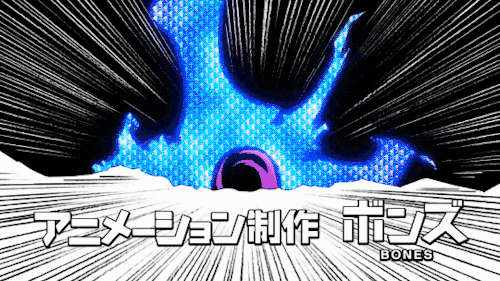
Made in Abyss (2017)
youtube
An anime that understands concepts of Scope and Scale and manages to bring what is normally reserved for feature films to an episodic storyline. Made in Abyss’ entire theme and story is that of exploration of the unknown and everything in this anime’s power is honed to bring across that feeling. Its art direction headed by Osamu Masuyama whose previous work include working on the background art for both Spirited Away and Howl’s Moving Castle, is painstakingly rendered to bring as much gravitas to the setting as possible, aided by the soundtrack written by Kevin Penkin which is just as much atmospheric as it is musical in nature. Every ounce of talent is focused on making Made in Abyss’ world, culture and characters feel solid and real. And unlike other anime with cutesy art styles but dark subject matter, Made in Abyss’ darker tone is established right in the first episode and gradually builds to its first season’s climax, rather than blindside its audience out of nowhere.
I sincerely cannot sing this show’s praises enough.

It also doesn’t hurt that the animation itself is fluid and lively.

Re:Creators (2017)
youtube
When I gave this to an animator friend of mine, one who is NOT as big a weeb as I am, he referred to it as “if Ready Player One actually knew what it was doing.” Re:Creators is one of a trend of some anime where the narrative is extremely meta in nature, but rather than use this as a form of parody, Re:Creators instead focuses itself on using its meta storytelling to shine a light on Japanese popular media as a whole, both from the side of the creators who MAKE such things, as well as the side of the fans and not only their response to media, but their interpretation and addition to popular media. And unlike the more critical approach several horror anime have taken in the past, Re:Creators also shows the positive effect stories in the form of anime, video games, manga etc both on those who read it as well as those who create it. And show how fan creations and their responses and reaction to media are just as important and enriching to works like this as the very people who create them.
It’s also one of the first shows from any country that correctly portrays what online fan culture is like. Both good AND bad.

Erased (2016)
youtube
HOO BOY. The Big Guns. Most mainstream anime set in a modern setting inevitably seem to involve high school or at least characters who are high school aged. Erased, however, deals with a protagonist who is 28 years old. Due to time travel shenanigans, he is transported back to 1989 when he was 11 years old growing up in Hokaido. So already, this anime is complete skewing the generic setting for stories of its type, further hammered in by the fact that the show has no romantic subplot in it. There might be a smidge of something like “preteen romantic feelings” among the children but as far as “female hero the protag is going to fall in love with at the end” goes? Yeah there’s none of that.
Erased is an extremely dark anime, but not in the way Made in Abyss is dark. Whereas Abyss’ dark tone comes from things like getting eaten by monsters and body horror caused by the Abyss’ curse, the dark theme of Erased on the other hand is much more horrifying as it comes from “reality”. And it’s because of this I WILL have to warn people about its plot points because it WILL and DOES get uncomfortable.
The plot of Erased is our 28 year old protagonist gets hurled back in time to when he was 11 years old in Hokaido, as I said. In the winter of 1989 there were a string of child abductions and murders, and it’s up to our main character, again in his 11 year old body, to solve these crimes to prevent a tragedy in modern day. Not only does the show deal with the very uncomfortable topic of child abduction and murder, but a MASSIVE part of the plot revolves around the would be murder victim, Hinazaki Kayo, who is living with her physically abusive mother. And unlike shows like “Magical Girl SITE”, the abuse is not shown as “suffer porn” and blown up to be so over the top in how bad it is, ut is instead extremely grounded and feels waaaay to real to the point of being very upsetting. However, the abuse is not there to make the audience sad. The abuse is in the plot to further press upon the audience the borderline helpless state our main character is in. As a child, he has to rely on his experience and ability to think like an adult to try and prevent the serial murders, as WELL as try and get Hanazaki out of her abusive situation. It also serves as a learning experience for our main character, and him figuring out how he hasn’t changed at all since he really was a child, and how his own stagnation in life itself needs to change and be redirected. The show is bursting with tension and every episode exists to turn the stakes up just a little bit higher.
I’ve heard some people are extreme disappointed by the show’s ending which I will not spoil, but personally going into it completely blind, I didn’t find any of it to be a let down and its very quickly become one of my favourite anime of all time.

The Ancient Magus Bride (2017)
(I actually don’t like the intro to Ancient Magus Bride so it only gets a link since I can only embed 5 videos)
https://youtu.be/KuZbmLLv1vM
Based on a manga by Kore Yamazaki, who has stated that her reason for writing the story was out of frustration that in “Beauty and the Beast” type stories, the beast always turns back into a human at the end. However this anime is far more than just a monsterfucker’s romance novel (although it... DOES follow a LOT of those tropes but hear me out.)
Set in the English countryside (although our female MC, Rise, is herself Japanese) the show makes heavy use of english folklore. Faeries are a constant presence throughout the show, and these are not the “nice” kind of faeries you’d see in Disney. Despite theyr good nature and honest want to help, these are the kinds of faeries that will kidnap you to their realm if you so much as let your guard down. We also have excellent portrayals of Titania, the queen of the faeries, and her heated relationship with her husband Oberon. Several other creatures from folklore make an appearance too, as well as old traditions such as faerie rings, seeing stones and the magical properties of herbs and flowers.
But beyond all of that, and even beyond the romance tropes or monster protector who is also a threat and powerful lead female who also needs protecting, the core theme of the show is on life. Or more specifically, death. Rise is a girl who is suicidal. And despite her not making any kind of suicide attempt in the show, this is a fact. The majority of the show is focused on Rise learning to “be alive” again, as well as process what life is, as well as what death is in its many forms. The show is a slow build of Rise reclaiming her will to live, not because of a romantic partner, but for herself. Reclaiming her own importance as a person removed from who she could be useful towards, and a slow coming to terms with a truly terrible event in her past and letting go of a traumatic past.
The show has some pacing issues here and there, but I still qualify it as one of the better modern anime shows to have come out in years, and can only praise its life-affirming message it’s trying to tell.
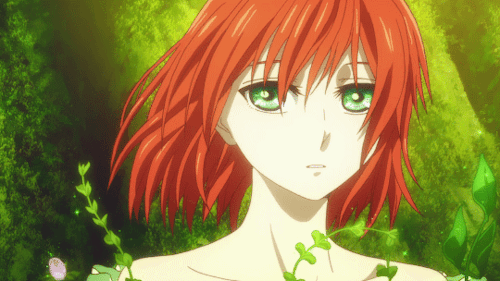
Osomatsu-San (2015)
youtube
I am.... not entirely sure how to explain Osomatsu-San.
Based on a manga published in the 1960s by Doraemon Creator Fujio Fujiko about 6 identical sextuplet brothers and their friends... the current and newest anime adaptation has borderline nothing to do with its original incarnation which was more your typical Showa era “hi-jinx” type gag manga. I think the very first episode of Osomatsu-San (which is not available for official purchase last I checked due to copyright issues) sets up the entire show perfectly, as the 6 boys and their friends learn they have a new anime adaptation coming up and realise that nobody in the modern age will want or even understand Showa era manga. So, instead, in an effort to be like “a real anime” they go about parodying literally every popular trope and show that’s out at the time. From yaoi-incest baiting to Jpop boy band to Attack on Titan to Sailor Moon, they keep cranking up the “modern anime” aesthetic until it literally explodes and collapses in on itself. And after realising they don’t have what it takes to compete in a modern anime word, the characters resign themselves to being losers who will never achieve anything in life.... and that’s where the show starts.
I can only refer to the show as “Millennial humour: the anime.”. 90% of it is just comedy with our 6 main characters who are, at their core, pretty terrible people. However, their issues and struggles of trying to be adults make them some of the most relateable anime characters out there. The show bounces from parodying popular culture both in anime as well as in movies to outlining the problems of trying to be a late 20-something year old in modern society to actual hard hitting drama that actually makes you angry because how DARE this stupid show actually make you FEEL things???
It’s borderline impossible to try and explain this show because, just like its 6 protagonists, it doesn’t seem to have any direction in its life. Which is exactly the point.

39 notes
·
View notes
Text
AF Alice Rank
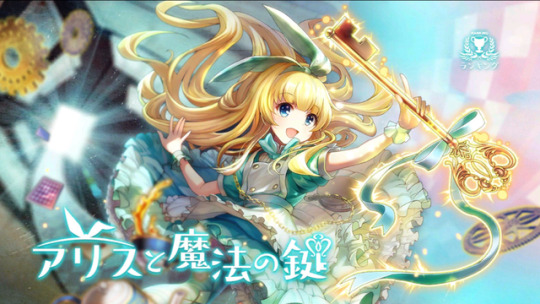
In the AF Alice rank, Sakura (who plays Alice) tries to revive her theatre group using a magic key.
This post also includes an unnecessarily long analysis of the theatre group series in general.
Shichirin (I really hope I am pronouncing this right), was a famous theatre group, renowned for doing plays of popular fairy tales, whose members all turned into tamashii when Lost happened. Sakura seeks out Chihiro, hoping she will lend her an artefact (AF) that will help her find the missing members.
As it so happens, the Magic Key was recently completed. This powerful AF has the ability to transport its user anywhere they can visualise, by bending the space around them and creating a “door” which is basically a teleportation portal. However it requires a tremendous amount of willpower to control, and, as a tamashii has never used an AF until now, Chihiro has justifiable concerns.
But a Magic Key sounds perfect for a girl who plays Alice, and Sakura assures her she will be able to control it.
Ofc she doesn't, as Takuya and Yuki find out when they are asked to investigate a tamashii that has gone berserk.
Throughout the quest, we see various flashbacks of Alice with the rest of Shichirin, emphasizing how much she loves being in the group, and everyone in it. First, Kanzou (who plays Captain Hook), remarks that she will probably be good enough to replace him as the face of the theatre group soon. Then, Sakura stays back after normal hours to practise more after receiving some advice she got from Kuroe (who plays Tinkerbell). Her enthusiasm cause the other members to also stay back: Yoshiki (Playing Card) and Chizu (Queen of Hearts).
It's very obvious Alice loves the group and that's why she wants to revive them. But just the act of wanting isn't enough. As Chihiro explains when she catches up to us, Sakura’s image of where she wants to go is not strong enough; to make the key obey, Sakura needs to think about not just the act of reviving the group, but also what she wants to do afterward (seems very similar to the predicament of another character in main story). Essentially, the key needs her to have a clear vision of the future in order to behave.
Chihiro also informs us Sakura was close to another actress named Kaede, and apparently they made a promise just before Lost happened. It’s likely to be a clue to making the key behave, but it looks like Sakura has forgotten about the promise after the shock of turning into a tamashii.
We actually did see Kaede in one of the flashbacks. Kanzou didn't want Sakura practising when she should have been taking a break like the others, but he also wanted to acknowledge the work she was putting into her role. So he gives her tickets to see a different production of Alice in Wonderland, by a theatre group called Futaba.
Kaede is the actress of this other Alice. She sees Sakura practising late at night and decides to join her. Sakura praises her for her performance, but Kaede has doubts about her acting, something Sakura can relate to. They decide to practice together.
One day Kaede asks Sakura what she would do if her group hypothetically dissolves. Unlike Shichirin, Futaba is a small theatre group and so such a possibility is always looming over them. After some thinking, Alice replies with “I’ll revive them”, and Kaede agrees she would have given a similar answer. To both Alices, their theatre groups are like family: warm, fun and full of the people they love.
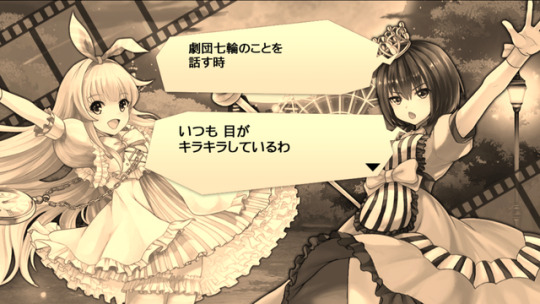
Kaede remarks that every time Sakura talks about Shichirin her eyes light up.
Kaede then says she’d like to see Sakura’s ultimate performance of Alice some day. Sakura makes a promise then and there that she will show Kaede her best Alice performance, as well as her beloved theatre family.
Sakura remembers the promise after some prompting from Yuki.
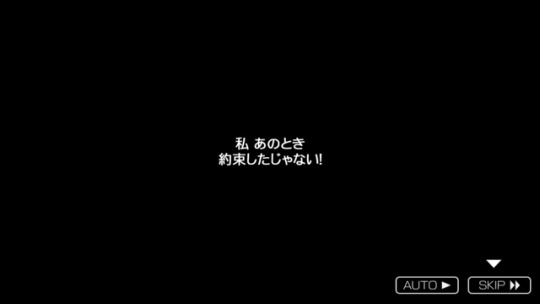
"That’s right, I made a promise! I can’t stop here!"
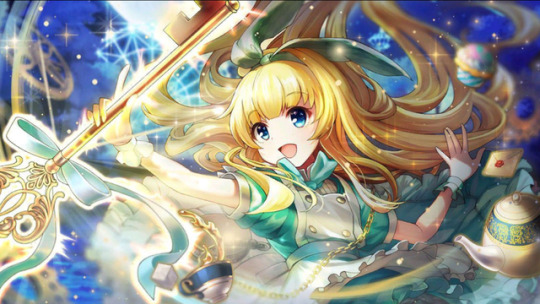
She gets the key to work, and awakens it by using it on us. Then she heads off to revive Shichirin.
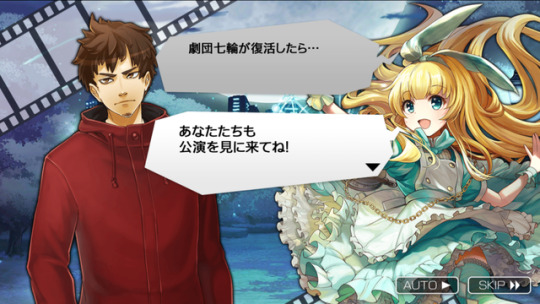
"After I revive Shichirin, you guys should come watch our performance too!"
In the epilogue Chihiro apologises to Kirihiko. She had no idea the key would go crazy like that, although Kirihiko says Sakura’s will was actually quite powerful and she was able to contain the chaos very well.
Also, we get a hint that Kirihiko might know something more about the Shichirin tamashii?
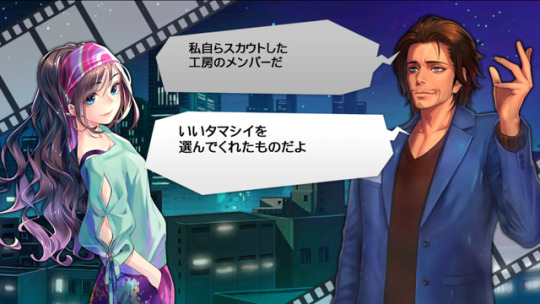
"So, it’s the Shichirin theatre group. As expected of a member of the workshop I scouted out myself, you’ve selected a great tamashii."
Much Thinking about Nothing
On the topic of this quest, I’d like to take this chance to talk a bit (sorry I actually mean, a lot) about the theatre group in general, which is something I’ve been wanting to do for a while now. Because I feel these series of quests subtly shows just how clever the writers of this game are.
The theatre group Shichirin, comprised of a bunch of actors and actresses in costume, is one of the more distinguishable set of characters in Shoumetsu Toshi. They were a famous group, reknowned for their engaging plays. But they were bought out by the circus group Anglermain (sorry if I spelt that wrong) and were involved in Lost shortly after that.
Prior to this rank, the only way you would know anything about them is through their advents (a rotating set of quests that are available to almost all players. There are two types: ones that give evolution materials, and ones that give you the tamashii. Shichirin advents are the latter).
Overall the main gist of the series is: Yuki and Takuya are investigating the theatre members to figure out what their last performance was going to be on before Lost. Was it Peter Pan? Or was it Alice in Wonderland? (who really cares tbh. Also they never find out.)
The Shichirin advents have a unique structure:
Sakura has a weird conversation with one of the NPC characters (like Geek or Researcher). She is actually just reciting her lines as Alice but they think she is actually talking to them for real.
Gameplay bit. Takuya and Yuki search for one of the members of Shichirin, and then fight them.
After defeating them, we see a flashback of them talking to Sakura off-stage. It hints at internal politics but as it’s “adult’s business” they tend to leave Sakura out of it.
I’m gonna give my thoughts on each of these, and then relate what we know back to the ranking.
1. Sakura’s convos as Alice are meta af
As mentioned, Shichirin advents begin with NPCs like Geek and Headhunter mistaking Sakura reciting her lines as Alice for actual conversation. The surreal miscommunication can insult, intrigue, confuse and bring new perspectives to them, highlighting the bizarre meta nature of storytelling, dialogue and words in general. Are Alice’s lines just gibberish? Or do they contain a more profound hidden meaning?
The interaction is multilayered, and can be viewed in many ways. First is the interaction between a “child” and an “adult”. For example, Scientist/Eiji dismisses her as a child for who a great scientist like him has no time for. But then she poses the question (or rather, recites her line): How is a dog and table similar? Scientist has something like an epiphany: “Wow I had never considered a perspective like that.” Then ironically when Sakura leaves he wants to chase after her to spend more time probing deeper into her mind.
The other example I like is Headhunter interpreting her words as accusing him of being greedy, which is really more a reflection about how he thinks of himself than anything else. Here we see a parallel between the “innocent” child who knows nothing of the real world, and the jaded adult who knows he is flawed, but also knows there is nothing he can do about it. In fact, Sakura’s innocence is also a key theme in the story of the theatre group, but I’ll come back to that.
Sakura is just an actress, so her lines actually don’t mean anything. But to her audience, they can get many different interpretations depending on their own personal context. It’s very similar to the nature of theatre and storytelling in general. Anyway, it’s all incredibly meta which is why I love it so much (for those who care, my favourite Shakespeare play is Hamlet for the same reason).
The other little thing I appreciate about this beginning section of each of quest is how Sakura’s lines suggest a nickname for everyone. E.g. Geek is Humpty Dumpty and Researcher/Yumiko is Caterpillar (for which she takes huuuge offense). There is probably a deeper meaning to these too, but again, different people will have different interpretations. That’s just the beauty of theatre.
Speaking of different nicknames, let’s talk about the actual tamashii themselves.
2. Every cast member has two names
Shichirin tamashii take on the name of their role (e.g. Tinkerbell, Queen of Hearts, Captain Hook. This also applies to Sakura/Alice, who isn’t even an advent tamashii). The first time we meet them in the advents, they are in costume and behaving just like the character they are acting as. It really is just like interacting with the actual character from the fairytale. It is also a good indication of how passionate they are toward acting, to have their tamashii show forms like that.
So it feels like a very abrupt change when, in the flashbacks at the end of the quest, we see them using their real names (which, until now, we've never seen used anywhere else). Sometimes their personality completely changes too (just like real actors). Thus, there is a clear distinction between what happens “on-stage”, and “off-stage”.
This ranking quest capitalises on that by almost exclusively using everyone’s real names. And this really highlights that these are actual people with authentic interactions. Maybe it is because they behave so differently from when they are on-stage, that their relationships seem so genuine. It gives the feeling of watching a “behind-the-scenes” of a movie or something. And by only seeing things through Sakura’s viewpoint, we get the sense that this is a very close-knit family, without even seeing any of their faces.
3. Something foul is at play within Shichirin
Sakura’s feelings for her fellow cast members, her family, are definitely genuine. However there is a lot she doesn’t know about the happenings off-stage, hinted at in the advents. The overly positive way she announces she will “revive Shichirin” at the end of the ranking also does not bode well.
In the advents, Sakura is treated like an innocent child who knows nothing about the true world of adults. Which I guess by proxy means we don’t really know what’s going on either. There’s something about “taking sides” (Alice in Wonderland vs Peter Pan?), the possible dissolution of the group, and, by far the most interesting, the eventual sale of the group to the circus group (and front for the organisation) Anglermain.
Kirihiko’s words at the end of rank seem to be foreshadowing that we may learn more about Shichirin in the future.
Lastly, can I just say I’m really glad they finally explained Kaede, because having two tamashii called Alice had me confused for so long.
5 notes
·
View notes
Note
I was wondering if you could pls describe (or show me some tags if its easier) the traits of some writers of spn..? I usually hear "X writer usually writes more sam" or "this strucutre is usual in X's episodes" but I've never been able to pick on those; the only ones I've been able to pick up are bucklmming and its beacuse they are somehow instantly bad :/ ps. u dont have to like explain EVERY single writer or anything, just general things that you know or notice in their respective episodes
Hiya :D
Yeah, it’s a thing that’s really, like, aside from Buckleming being bad and coming with a warning notice that we’re all helpless, please don’t burn the fandom down after their episodes, it’s not really more than nerdy interest that means anything about knowing who the writers are, so in that sense you have the toolkit you need to function :P
Buuut from my very very deeply nerdy and writery observations through what is now more than a decade (eep) of watching this bloody thing…
The show starts with a Generic Tone, and most of the original writers have this tone. This is in NO WAY a bad thing, but of all the writers, you have to really delve to connect common themes in their episodes, and for many of the writers who didn’t endure out of seasons 1-5, we don’t really have a clear profile on their habits, for reasons I’ll get to.
We can see Sera Gamble’s fingerprints a bit more because we get 2 seasons of her as a showrunner, but by and large as one of the original writers, she really sets the tone so her writing IS Supernatural, as much as Kripke or John Shiban or Raelle Tucker or Cathryn Humphries and whoever else wrote multiple episodes seasons 1-5. They have things they might like but dropping into a random early episode doesn’t give much away because they had a much tighter playbook.
1x13 shows this because despite serious, painful hindsight of all the things they do wrong that we recognise NOW from seasons of their nonsense, Buckleming wrote far more to the brief than they ever do these days; the difference in style has to be almost entirely attributed to being a first season and close creative control and enforced use of a playbook that disguised a ton of their worst habits which go unchecked these days, and @justanotheridijiton has dug up evidence of them cheerfully commenting on writing in such a way into deep history >.> Despite it being technically their best episode, they were fired and given a 6 year writing ban until Kripke left. So I’m guessing it was fairly obvious they had these problems regardless.
Of all these writers in the early seasons, Edlund pops up in season 2, and he is a wild card with a personality, and he does not write ~generic SPN~ and never did: it’s always Edlund SPN and it gels perfectly with the slightly less technicolour SPN, frequently breaking the format and creating the modern version of SPN… If he does comic it’s Bad Day at Black Rock and if he does deep it’s On The Head Of A Pin, and if you look at what he wrote, very very few of his episodes are duds, because he has a brain swirling deep with interesting and bizarre nonsense. He’s also the biggest Cas stan ever.
Jeremy Carver pre-Carver era helped, which I think is why he gets to be part of Carver Edlund - we have 3 and a half years of his showrunning to know what fascinated him, so I’ll just say, in his very first episode in season 3, he alludes to Cain and Abel for the first time. He’s very big on narrative structure being used in fascinating ways, and his episodes are all very technically accomplished, but the downfall was that by the end he was writing narrative symbolism as a sort of withered husk of his former self with no emotion whatsoever, just hitting storytelling marks. 11x01 is the single most depressing episode to me in terms of “this is the man who wrote Mystery Spot and Changing Channels”
Fortunately, and I’m skipping over a ton of writers to tell this story, but could go back and talk about more of the interesting ones in between, if you watch 11x01 and 11x02 back to back, they work perfectly as a single episode and it’s like after the break all the life and emotion and intrigue is breathed back into the show in a rush of colour and character. Now, Dabb is one of the OG writers in my standards, in the sense that he and Loflin showed up in season 4, and to this day Dabb’s writing to me still shows a touch of writing within the original SPN playbook as a writer who CAN write alongside Kripke, Gamble, etc, and chameleon into the background as not writing Dabbnatural, but writing Supernatural. To me this is a part of his strength when it comes to story and why he and originally Loflin shot up the ranks in Gamble era to the point where they wrote 7x23, and from there Dabb always wrote the second, middle and last episode in a second-in-command writer role, which, now we hit season 14, means that’s half the length of the show he’s been clearly estimated as one of the powerhouses.
Because he had a co-writer for 4 years, originally you might think that it’s hard to tell what he is and isn’t writing, but he and Loflin split up, I hope just to ease empty seats in the writer room, and we get 2 Loflin episodes which betray a few of his weaknesses when it comes to story/structure/pace, but reveal he was the quippier, funnier, more manic one of the two. Like, I’d say Plucky’s (my no joke favourite episode) is probably something where he would have steered it more than Dabb :P But Dabb meanwhile, writing alone, writes 8x08 which is also funny but in a very sublime way based on situation and framing etc which makes us laugh without breaking up the story for quips so much as coming from character, such as “it’s a shortened version of my name”, “stop smelling the dead guy, Cas,” and ALL the uses of cartoon effects as part of the embedded storytelling. It’s like his resume for considering what he can do as a solo writer and he blows it out of the water.
Dabb is very good at characters who might have brief one off appearances, like, even within a scene, but still have a bunch of unique personality, as well as excellent handling of the main characters, and he can write some killer speeches and emotional pleas and stuff. He’s also absolutely filled with callbacks and repeats and narrative loops, and he started this on a smaller level, either to his own episodes, or dutifully doing his job to foreshadow and build the mytharc, but in Dabb era, this has turned into absolutely exploding the show’s callbacks into a weird fractal of meanings, which I think works wonderfully for supporting a 14 year old show on its own legs, because each callback and loop goes in a different, often wild direction, but still at the same time has an emotional continuity and truth to the story based on the story predecessors. The fact he writes like this is of no surprise to meta writers who’ve been keeping tabs on him far longer than I have. In fact, a combination of all Dabb’s strengths put to work versus his One Weakness, his kryptonite, is a terrible story of Lizzy’s hubris of not paying attention to the show and a hard learned lesson :P
After 10x21 I was utterly bereft and hated the show for what it had done, but I was gonna keep watching, as sarcastically and eye-rollingly as I could, and 10x22 started to deliver in spades. Dean drove ALL THE WAY down south and back, somehow missing Cas tailing him (without a car, we later learned) and all while Sam was on an urgent timeline to get things done before Dean got back… driving an hour back and forth in the immediate vicinity of the Bunker. The last times we see Sam are Urgent Driving Montages to get there in time while he’s basically coming from up the street, and meanwhile, Dean and Cas have logged like 20 hours of driving plus farting around murdering people, and I was GLEEFULLY tearing this episode to SHREDS for its car continuity, like, HOWLING with laughter.
Anyway I took a break to get some tea and came back ready to eye-roll through the end of the episode, hit play, and walked smack into the DeanCas confrontation and dramatic speeches about everyone you love could be dead, except me, and accidentally got so tense and enraptured that I spilled an entire mug of scalding tea down my front when Dean attacked Cas and I jumped out of my skin and screamed and then yelled again because OH YEAH I WAS HOLDING TEA, and from that day on I have A: loathed Dabb for his car continuity and B: always kept my eye on that fucker and when it’s his episode and what he’s up to… Once burned etc…
Dabb’s squad are awesome though. Obviously excluding buckleming, and I think with all the bingos and complaining you know what to look for in their episodes :D
Berens has been around since season 9, which makes him a veteran in remaining writers terms, just because Carver era had an en masse leaving when contracts were up (no hard feelings, just bad timing and Berens had been newer than all of them at one point :P) Berens is another writer I think can occasionally dip into pretending to be generic SPN on some mytharc episodes but he’s just obviously not been around in ye olde days, and joined in the time when, through Gamble era and then Carver in spades, the MotW writers in particular really fell into a new style of writing the show that I absolutely adore, which is where the individual episodes rather than mytharc stuff were increasingly left to the writers to do whatever they wanted with, and become more and more writing style and structure etc as standalone canvasses for your own skills, personality, etc. Because you CAN’T keep writing the same SPN episode over and over and over, and if one of the season 1 writers came back and wrote a season of season 1 style episodes, they’d be stiflingly boring, in tone and range, compared to what we have now. To keep people interested after so long, quirkiness and the ideas that an individual writer brings to the table as THEMSELVES, becomes increasingly the only way forward to keep the show fresh. Season 4 onwards began to have more of this, and Edlund had been doing it since his first episode anyway, but to me season 6 has very specific feeling tones for the episodes, while season 7 and Robbie Thompson’s arrival in particular start to set the tone for allowing the writers to be adventurous, and to me season 7 is the shift to the style of season we had from then onwards.
I think Berens episodes feel quite muted and cleverly restrained, but really really intelligent behind that. He’s written some incredible episodes that turn the season on the head while being standalones, and his run of 14th episode being where things were knocked out of the park but on a small stage, like, conflicts in a storage unit, barn, submarine, the BMoL hq and an abandoned hotel, all have devastating and dramatic emotional consequences while still somehow seeming understated and natural, quiet, almost, in the sense of what they turn on - looks and small agreements and emotional revelations etc. He doesn’t do fun and loud and flashy very often, and he delves very serious themes of suicide and depression, so I read his episodes and quiet, powerful, and very very pointed and driven and well-constructed to get to that point. His back and forth between scenes for dramatic irony is one of the biggest features I enjoy and identify, and that was an overall theme in season 13, on a much bigger level. 13x21 and Sam’s death, and, well, the whole thing really, was a wonderful example of the tension he can hold you in this way. Also: proof he CAN have fun but only when it’s super gay :P
I think Meredith Glynn gels really well with his writing, to the point where they co-wrote an episode within her first year on the show and then she took over the 14th episode slot for the first time since Berens got to the show and wrote an excellent episode that you could have told me was one of his and I’d have believed you, since it was structurally very very similar to any of his episode 14s which I have legit started seeing as a subgenre of the show in my own weird brain sorting way :P She has a great deal more fun though. She accidentally made the Worst Timed Episode Ever In The History Of Anything with 12x05 and I think got off on the wrong foot with fandom, but since then every episode has been an improvement on the last, and she’s had some absolutely wild rides, with 13x08 being I think her masterpiece overall, though Gog and Magog are funnier as an individual set piece :P
Her writing is playful and fun and shows a deep care for the character histories and how they affect them - 12x11 is hard to believe is someone’s 2nd episode if you don’t think the new writers did their homework, because she absolutely guts Dean, and throws in a Rowena backstory freebie along with, AND handles Sam handling Dean with perfect ups and downs and brotherly affection and horror etc. I also think her Gabriel episode is the best Gabriel episode ever, for him as a character, and in terms of fun, the unholy combination of her writing and Speight directing and acting and also acting was utterly unbelievable. 10/10 would use as the episode to drag friends back to the show if they only saw seasons 1-5... It’s not even comparable with her other episodes, because she seriously levelled up as a writer while doing it. I can’t wait to see what she is up to next season :D
Davy Perez is like the dark side of the coin of Glynn, where he is fun but dark as fuck, and 13x11 has the best example of that with his cheery music-playing serial killers, but it’s an attitude he’s had all along. He does his best with Buckleming characters they do their worst with, so he singlehandedly made me think things for Crowley weren’t going to be as bad as they were in season 12 with 12x12/15 and he absolutely was the only person to give Ketch and Asmodeus anything resembling an interesting dynamic in 13x17. 12x12 was an absolute masterpiece of non-linear writing, which requires a good brain to do and then he made it funny AND all while ripping off tarantino but in SPN and not making it corny and writing Cas and Crowley’s most dramatic love confessions… 12x04 was my personal reassurance that Dabb era was going to care about Sam again after Carver neglected to deal with his shit for 4 years while dumping on him in the narrative, and Davy betrays the old Gamble sam girl traits of doing stuff like tying him up and telling us in the same breath his heart is worth 100x its weight in gold :P
His episodes are wacky and fun in a way that draws blood and makes you seriously fear for the characters, even ones you think are fine and can’t possibly die in that episode, and his darkness frequently takes what looks like it could have been a Buckleming brief and makes you care about the characters they’ve been mauling all season in their own mis-applied love of writing the villains. You NEED someone who loves writing the villains, and Davy has a real relish to it that doesn’t woobify or jerk off to their evilness, it just makes them raw and scary to the point where you might actually believe Asmodeus is threatening for half a second, or that Crowley could win season 12, or to sell us on Ketch having a glimmer of a soul.
As for Yockey… I don’t know where Dabb found him but thank GOODNESS he did because sometimes you just need to take a random gay playwright with minimal TV experience, throw them into your writers room, and say, here, go nuts. Yockey has written like half a SPN episode and multiple literal excellent stage plays that are somehow on screen with our characters, which got to the point where in 13x19 I wrote like 40k episode notes while openly weeping because my Literature degree was being yanked so hard :P His nonsense often has multiple amazing side characters, like, sometimes a LOT of amazing side characters, and he knows how to make them all work. He literally has rude mechanicals like in 13x19 and the poor drunk angel. Shakespearean tropes. If you’re ever watching a SPN episode and it’s like why is this person writing for us and not a world famous literary darling? then it’s probably a Yockey episode. I am still struggling with how to handle it, and describe what’s going on, and all I can think is of 12x10 where an article about it literally was like, here is every single episode Cas has ever been in, and how this episode pulled on it and turned it into magic gold. Like, now 4x16 and 6x20 are the straw that Yockey turns to gold. I am too emotionally compromised to write something coherent and non-fangirlish about Yockey because he’s like, #writergoals in a totally bananas set the bar as high as the moon kind of way. He’s got that rare once in a generation talent and dammit I think he counts as my generation, so there goes my chance to be that person :P
And he’s writing for fucking Supernatural.
167 notes
·
View notes
Text
Double Decker 12 - 13 (FINAL) | Golden Kamuy 23 - 24 (FINAL) | Merc Storia 11 - 12 (FINAL) | Zombieland Saga 12 (FINAL) | Gridman 12 (FINAL) | Cells at Work! 14 (OVA) | Shield Hero 1 | Boogiepop 1 - 2 | Egao no Daika 1
Trigger warnings for rape and slavery in the Shield Hero commentary.
Double Decker 12
Deana’s actually kinda tsundere…that’s kinda amazing to see, really.
I noticed Doug’s phone says “Dr. Apple”. Haha.
Kirill’s special. But why? You never answered that, people! Update: It’s because his antibodies are an antidote for Anthem.
There appears to be a Shell logo on one wall of Derick’s bar…LOL. Shell exists in real life. Why do we want it in an anime, now…?
I laughed so hard when I saw the landlady with what remained of Seven-O, hahaha.
Travis and Sophie, huh? Is it a ship or a working relationship? Who knows?
Oh! This didn’t make sense until Derick declared the bus was a bar. Rigggggggggght.
Kirill, believe in the Doug that believes in you…or something like that…
Kirill’s holding two guns, so when Cooper says, “Put down the gun,” which one does he mean???
“And Then There Weren’t None!” – Parodying (Agatha) Christie again, I see? (Referring to Hyouka’s Why Didn’t They Ask Evans parody, Why Didn’t She Ask Eba?.)
Golden Kamuy 23
How did “pig food” in a sentence become so terrifying???
Why is Tsurumi’s head leaking???
*Sugimoto bashes the earless twin with his prosthetic foot* - Well, that’s one way to get a leg up on someone…okay, I’ll see myself out.
Merc Storia 11
If Orthos is complaining about rain, why is he a water-element unit in the game???
This show is gorgeous. Not to mention the backgrounds look like they’ve been ripped out of the game…
Aw, Orthos is kinda cute. Kinda tsundere. I wonder if he wanted to hear “happy birthday” from Raviol…?
Every time I watch through the ED, I think Raviol’s going “Geddof me!” to Yuu.
Zombieland Saga 12 (FINAL)
The Yuugiri slap returns!
The 21st of December seems to have been the original airdate of this episode…
Karatsu-jou is Karatsu Castle, quite obviously.
Wait…does this mean Kotaro Tatsumi’s real (last) name is Inui? Or was this a “I changed my name bcause my mother/I (re)married” thing?
There’s an end of episode segment…keep watching.
That was…such a non-ending! This definitely needs a season 2 if it wants to finish its storyline! Plus, Yuugiri, Tatsumi and Tae never got their focus episodes!
Gridman 12 (FINAL)
What the heck was up with that smoke cloud? It looked so real, and yet so out of place!
Ooh, I see Anti now has the ability to transform by himself…although I should’ve figured that out last episode, since I think that happened then as well.
*Anti gets stabbed with Alexis’s sword* - What the hck just happened to my garbage son??? (refer to This Week in Anime for how that nickname came about for Anti)
Eyy. So you’re saying Gridman was a magical girl robot all along? Haha…hahahaha.
So basically, it’s Boueibu LOVE! but with less meta. With lessons of mortality instead of the Kabuki Rule. Akane’s basically female!Kinshiro, right down to the hairdo…
Wow…someone really ran out of budget. It’s literally just a slideshow, but with black and white over it.
Oh, there’s actually a nice piano song in the background. So maybe I was wrong about the budget…? I don’t really want to go and watch the slideshow again, y’know.
There’s a random live-action segment at the end of this show??? Wuh??? What do I need to expect next, a talking meteorite??? (referring to Dimension High School)
Okay, seriously??? What was up with live-action Rikka???? I don’t get it… Update: Okay, so the live-action girl was Akane, not Rikka. That’s why it was so confusing…
Double Decker 13 (FINAL)
I laughed really hard at the explosions. Probably because I Photoshopped someone into a picture of an explosion and the scene with Kirill being shoved forward by an explosion reminded me of it…
I wanted Max to slap Travis, as weird as that might be for a show like this (but not for a show like Zombieland Saga). A punch in the gut’s good too, though.
“To be continued?” – Oh. Ohh. Ooh…Heh. I already knew there were some extra episodes, but at this point, there’s no ruling out a season 2, either…hmmm. I really wouldn’t mind a season 2, y’know.
Golden Kamuy 24 (FINAL)
For some reason, I’ve ben referring to Hijikata as “old fart” for the length of this episode (meaning “not long”). He’s an impressive old fart, to be sure, and he was hella nice-looking in his heyday, but in the age of Golden Kamuy, he’s still an old fart.
I thought “Say hello to my little friend” was from Scarface, not…whatever Tsurumi’s pulling here. (commnt made in jest with straight face)
Seriously, what happened to ruin Nopperabo/Wilk’s face, anyway?
Someone make me a Civil War poster with Golden Kamuy characters, stat!
Wait, so Kiroranke, Asirpa and co. are headed north to meet up with Kiroranke’s allies, which could cause a civil/national war. Hijikata and Blockhead Dick-sensei (forgot his name) are headed south due to the info they got from Inudou’s hut (the chapel). I’m pretty sure that’s what just happened, but…I could have missed a bit and then I’d be wrong.
“Send the beloved child on a journey” is a Japanese saying, by the way. That’s (probably?) what Sugimoto’s referring to when he talks with the boat captain (the elder Koito). Oddly, the elder Koito seems to drop the last O from “-dono”, which seems to be a Satsuma thing…?
Cells at Work Special Ep (Ep 14)
Oh, you can see the effector cell amongst the other T Cells! Hello there!
I remember studying stuff about how a cell divides…man, that was at least 2 years ago! You’re making me feel old…
*Helper T Cell appears* - Gaddangit, Kazuma! (from Noragami)
Merc Storia 12 (FINAL)
There’s just something too awfully cute about a brother leaving the “nest”.
Even birds need to learn to fly. I wonder why Orthos didn’t…?
Ah! It’s one of those low-level hooting monsters! I’ve seen them in the game but I don’t know what they’re called…Update: They’re called Goldories. Spoke too soon…
Well…that’s a bit frustrating. That’s the second non-ending this season…hey! I’ve seen that elephant in the game! Plus that slime! (LOL, I’m so easily distracted…)
Ooh, that non-ending. I’ll give it a piece of its mind by giving it an average rating on my AniList!!! Rah!!! Anyways, see ya later…for 2019 anime.
Shield Hero 1
First anime of 2019 and it’s this one. Hoo boy – I’ve read one chapter of the manga, courtesy of CR. It’s gonna get nasty down in here, judging by the buzz that seems set to replicate Goblin Slayer’s…
Oh…that’s not a very favourable opening, the “It was all a dream” opening. Sure, it was gripping and showd Raphtalia (saw her name in promo material from ANN), but f*** if it weren’t overused at this point in time…
I always thought Shield Hero started out like Fushigi Yuugi…speaking of which, is that no longer on Crunchyroll?
Motoyasu’s got his own spinoff, so I’m hoping I’ll get to know him well over the next 12 weeks or so.
I find it interesting that they put the heroes together to reveal they’re from different versions of Japan so quickly. I’m pretty sure that didn’t happen in the manga.
Honestly, that “NOOOOOOOOOOOo!” could be an awesome reaction GIF. Just sayin’.
Sigh…Myne, Myne, Myne…you and your ways with Naofumi…
(Trigger warning: rape discussion) See? As I said, I knew this was going to happen. The thing is that it played out a lot more clearly in the anime than it did in the manga. As much as I don’t like the trope of “rape as accusation” enough (enough to have never encountered it before), it would be hypocritical of me to say I haven’t used it before – it appears in Half-Paid Heroes. However, one year out from having written it (due to the #MeToo movement), I can only say “rape is so not on”. I do not condone rape, but from a storytelling perspective it’s the perfect trope to make a character look like a monster and it makes a clearly false accusation have more oomph behind it, so…let’s just say Shield Hero’s doing its job here, making me despise Myne and the system in this world. Besides, I only stand on the side that does the better story.
For some reason, Naofumi’s “You can shove it all up your a***!” demand reminds me of when I’m angry and doing unreasonable demands…which means it’s won me over now.
I just realised…there hasn’t been much music until now…
(Trigger warning: slavery discussion) Oof. Now they’ve gotten to a new low of depravity in this show. Naofumi’s probably gonna buy a slave…again, I don’t condone this, but I assume Raphtalia is here.
Yep, even without knowing past ch 1, I was right on the money. That’s Raphtalia!
Poppies, huh? The symbol of bloodshed. What a perfect flower for this show, which demonstrates Naofumi’s blood, sweat and tears…
As much as I don’t condone some of the acts done in this show, I see some huge potential. Even if it’s got controversy flying around it like flies, I’ll stand with it. Are you with me?
Boogiepop 1 – 2
Double length premiere…oof, this’ll be tough on my spare time. Lately, I’ve been told to clean up the house a bunch and doing all manner of other things, so it’s just eating up time on all sides.
OP start is…for some reason, never a good start. For some reason, I just don’t like it. Maybe that might be the fact I was taught to start with a compelling opening scene when I was a fiction writer, though.
The subber got so bored they even subbed the Dengeki Bunko logo in the corner…wow. (sarcastic)
For some reason, the art style reminds me of Banana Fish (or Parasyte). Must be the chara designs.
This seems to be coated in a fine film of 90s edge. Or maybe the early 2000s, because that’s when this really comes from. C’mon, Takeda doesn’t even seem surprised when his mouth hangs open!
Notably, Boogiepop uses boku.
Wait, I don’t get why Boogiepop is called that. They pop the boogie(men)? That right?
I started zoning out and fiddling with my wrist in the middle of this episode. That’s another bad sign…
Wow, that ending’s really minimalist.
Currently, this episode raises more questions than it answers. Its overall impression level is trending slightly towards the negative. There must be a double premiere for a reason, though…let’s move on.
Wait - Kirima Seiichi? Is he Nagi’s father??? How did I not notice that earlier?
That manticore business seems to be correct…according to Wikipedia.
This doesn’t add up. Taniguchi. Kirima. Maybe Taniguchi is the name of the mother/father and Kirima is the name of the other parent? Update: Spoke too soon on this point and a previous one.
Kirima’s OS appears to be Windows 10 with a few adjustments.
Wait, but isn’t Suema meant to be the girl’s surname? Or is it Kinoshita? Update: It’s Suema. Kinoshita is another girl.
This white-haired man is the one from last episode, right? I didn’t really recognise him since there’s always terrible lighting plus he was wearing orange then, but yeah. Can’t believe I didn’t connect the dots there either.
White-haired man seems to be like Anti from Gridman. I presume he’s Echoes…? Update: Yup, Echoes it is.
Egao no Daika 1
This sounds like it’s outside my field of expertise, but I’ve been proven wrong before with Planet With, not to mention Toshiki Masuda is a character called Huey Malthis. It seems to be pretty standard Princess and the Pauper fare though…
There’s just a bunch of tablets with fancy-looking English on them…the heck?
Is it just me, or did the mecha game have the solitaire success sound effect…?
Ooh, I sense animosity regarding Japan’s emperor abdicating within this show (in a metaphorical sense)! I could analyse this show to bits, maybe…
The CGI in this actually ain’t that bad. Then again, we are talking about mechs here…
Oh, end of episode segment. Keep watching…
Well, I noticed the characters go off model if you’re paying attention to something you shouldn’t be, but otherwise, it’s a respectable first episode…respectable, but fairly average.
#simulcast commentary#merc storia#double decker#double decker! doug and kirill#zombieland saga#golden kamuy#Gridman#Boogiepop and Others#Boogiepop wa Warawanai#Egao no Daika#the price of smiles#The Rising of the Shield Hero#tate no yuusha no nariagari#Chesarka watches ZLS#Chesarka watches Double Decker!#Chesarka watches GK#Chesarka watches Merc Storia#Cells at Work!#Hataraku Saibou!#Chesarka watches Hataraku Saibou
5 notes
·
View notes
Text
[Analysis] The "Weird" One: Where The Last Jedi Fits
View On WordPress
I have a confession to make.
This may be a weird way to start what is essentially the first post of a new media critique blog, but I consider it to be essential knowledge. Every reviewer and analyst brings their own unique perspective to their writing, and I am no different; sooner or later, this truth will make itself known. To know this fact about me is to gain a new understanding of what makes me tick as a consumer of art, and it is one that it best to get out of the way as soon as possible, for it is better for a reader to lose interest now than to string along until the awkwardness of hiding such a secret reveals itself.
Here it is:
I LOVE the Star Wars prequels.
Oh, not only do I love them, completely and unironically, I actually do not care much for the original trilogy. It’s all right. But it doesn’t make my heart sing.
Attack of the Clones does.
Okay, okay, I can already hear the groans of disgust and the clicks of mice leaving my blog to the wilds of the web, but I promise this is going somewhere. I am not unaware of the many flaws the Prequel trilogy has, and I can’t in good conscience call them cinematic masterpieces, but I think this opinion derives itself not from poor taste, but the relative lack of blockbuster quality movies that tap into very particular themes and structural quirks that I appreciate. I may dive into those specifics at a later time, but the reason why I am bringing this up now is because it inextricably ties into my feelings about the most recent film in the franchise’s main series, which would be impossible for me to discuss without addressing this aspect of my formative film influences.
The Last Jedi has already received tons of coverage, controversy, and counter-controversy, so if you’re interested in picking apart the finer aspects of the plot and characters, feel free to look those up — I am sure there is a brilliant video essay on Youtube tailor-made just for you. I am more interested in the meta-narrative surrounding its position in terms of fanservice to what is an enourmous empire of not only fans of the original trilogy, but fans of its many derivations, spin-offs, and cultural foundations.
Star Wars is no longer just a film about a space farmer who learns he’s a space wizard and goes on a perfect beat-by-beat hero’s journey. It encompasses more than that: two sequels, an expanded universe of books upon books, comics, videogames, pinball machines — a holiday special (and no, I have not watched it) — toys, cartoons, parodies, reiterations, iconic images, phrases, cinematic touchstones, and, of course, the Prequels.
When the new Sequel trilogy was announced, the filmmakers had a real challenge to contend with: How can one follow up on not only a legacy of films, but also a legacy of expectations of what such a sequel would be like? I am not just referring to the fact that Disney, post acquisition of Lucasfilm, decided to just toss out the previous expanded universe, label it “Legends”, and start afresh with a new canon. I am also referring to the literal millions of fans who were already thoroughly familiar with not only the films but also their cultural impact. How could one possibly please them, especially when the Prequel trilogy was so universally mocked?
It was clear that Disney needed to win the crowd over, and to do so they leaned heavily into a safe bet: the Original trilogy. The Force Awakens released with a sort of wink-and-nudge, reflected in its story beats, characterization, and practical effects, that said “hey, we hear you. We know you’re scared because you don’t trust us to do this material justice and we know you love the original films, so we’re gonna give you exactly what you’re looking for”. It’s hard not to see the fanservice and whether or not it was successful has already been discussed to death, so I won’t get into it here, but the point is — and I am sure this wasn’t really intentional — to someone like me, who actually liked the prequels and a lot of the expanded universe, this approach felt incredibly alienating. Everyone was having fun with the new film, but to me it felt like it was saying, “all those things you love about Star Wars are not the reasons why anyone else loves Star Wars,” and I’m not gonna lie, I was pretty hurt, but at the very least The Force Awakens gave me a cast to fall in love with.
This is why when The Last Jedi was in production, I was intrigued to hear that this film was going to be “weird” and “unlike any other Star Wars film”. My expectations were tempered by the fact that ultimately this was going to be a Disney movie anyway, so it was probably not going to reach my standard of Weird (my dad showed me Koyaanisqatsi when I was 7, to give you an idea). Nevertheless, after the very safe rehash of Episode 4 that was The Force Awakens, I was just hoping for anything that might show me the franchise still had room for creativity.
I was in fact happy with the result, although it doesn’t surprise me at all that it attracted controversy. Some of my close friends, whose opinions I highly respect, hated the film for various reasons and I can even agree with them on some points. Others, like me, loved it. Overall, however, what I like most isn’t necessarily anything about the film itself, but its position as a nod to fans who wanted their corners of the Star Wars universe acknowledged. To put it bluntly, as a Prequels fan, I felt represented.
Going even beyond the Prequels, The Last Jedi contains themes from my favourite piece of Star Wars media, the Bioware-produced videogame Knights of the Old Republic and its Obsidian-produced sequel, which layer critique of what it means to be a Force user and what the role of Jedi and Sith are in the grand scheme of things. “Jedi” does not necessarily mean “good”, a fact Luke highlights in his role as reluctant mentor to Rey, and while there are some things I would change about his portrayal here, this perspective is absolutely one I wanted to see more of in the main series. Even as a kid, good-vs-evil stories bored me; it’s one reason why the Original trilogy failed to speak to me, because even though I wouldn’t have been able to articulate why at the time, the setup was just too easy. It didn’t challenge me to think that there’s a side that’s inherently good and a side that’s inherently evil, but when Knights of the Old Republic put decisions about when and how to use the Force in front of me, that was a much more interesting proposition, and the idea that doctrine about the nature of the Force could be wrong or even damaging was outright enticing. I honestly can’t remember whether playing the games or watching the Prequels came first, but I get the feeling it was the games, because that malleable view of what the Force means and who the Jedi and Sith are has carried through for me ever since.
The Last Jedi does kind of play it safe in some ways, ultimately being a Disney property that has to sell lots of merchandise and bring people to theme parks, but it also boldly rejects just about every expectation one might have of a “Star Wars Film”, characters make mistakes, they fail, things go wrong at the worst possible times, some act selfishly or foolishly, and by the time the credits roll there’s actually very little to be excited about, as the heroes are in a much worse position than they were when the film started, which was already very bleak. But in a way, that was the most exciting part to me, as someone who grew tired of the popular culture perception of Star Wars and who felt shut out of the Sequel trilogy by its first film; The Last Jedi may have been agonizing, but it was agonizing in a way that promised more, giving hope to those of us who were looking for a less straightforward narrative at a time when powerful politicians can be comically villainous in public and yet people would bend over backwards to excuse their actions as if an “evil empire” didn’t already exist. Over the last couple of years I have seen people post a gif of Padmé Amidala’s iconic line, “So this is how liberty dies… with thunderous applause”, saying this was the only part of the Prequel trilogy that aged well, and yet to me the truth was already glaringly obvious back when the film was released, contributing strongly to my own critical interpretation of it. The Last Jedi is a film that picks up on the thought that people can make foolish and terrible decisions and runs with it, but it is by no means the first in the series to approach this theme.
(I should note that as a Brazilian, whose country was freshly out of a dictatorship when I was born and which is now hurtling towards another at full speed, my views on what counts as an Evil Empire and how and why a democracy dies may be somewhat sharper than the average American’s. This is by no means the only reason why I’m into this kind of storytelling, nor is it exclusive to me, but it is a big one, and it would be short-sighted to ignore it.)
Ultimately I understand why The Last Jedi is so polarizing; it doesn’t pull punches and some of the punches it throws are even a bit misaimed, thus the description of it as “weird” and “unprecedented” makes sense. It just isn’t quite as weird or unprecedented when compared to previous attempts at broadening the scope of the Star Wars narrative both within the main film series and the expanded universe (at least pre-Disney; I haven’t engaged with any post-Legends canon aside from the Rebels cartoon, so I can’t say for sure). It also serves as a complete 180° turn from the Sequel trilogy establishing itself as a safe haven for Original trilogy fans and a middle chapter leading into a final film we still know nothing about, so whether its narrative leaps will pay off are still a mystery. In any case, The Last Jedi rejects superficial concerns in favour of theme, leading to a certain degree of dissatisfaction from fans who really wanted to know Rey’s parentage and what exactly was up with Snoke, but I think this is a good thing, because they gave new meanings to previously established Star Wars tropes and drove the whole thing into uncharted territory. I for one am glad the franchise has freed itself of these particular burdens; it simply remains to be seen whether the conclusion will maintain this momentum.
All this to say, I like the Last Jedi because it likes the things I like about Star Wars, and now I know I’m not the only one.
2 notes
·
View notes
Note
I wanted to get your perspective because you ship it and most of us have bias against it. Do you think Bell loves Echo as much as Clarke? I think he’s in love with her but does he love her as much or will he possibly discover in s5 that he doesn’t love her as much???Not trying to cheapen becho’s loving relationship, just wanted your thoughts.
Nonny - you did not ask for part of the below to bean essay on Why Becho Are In Love Goddammit, so I apologise to you bc I knowyou said it in the ask. But to everyone else I’m not sorry because I loved writingit all and I WANTED TO GET IT OFF MY CHEST OKAY.
Good evening Nonny, and thank you for your interesting andwell-constructed ask. Judging by some of the rhetoric I’ve seen over the pastfew days, there’s a very real risk of people throwing up in their mouths overwhat follows so I hope everyone remembers to floss and brush afterwards. Look after your tooth enamel kids, it can’tbe replaced.
So. Let’s begin.
I very much agree with you: Bellamy and Echo are in lovewith one another.
WAIT – HOLD YOUR SICKBAGS – THERE’S MORE.
Not only are Bellamy and Echo in love with one another butit is explicit between them. That’sright friends, I am 100% sure that Bellamy and Echo have done that. No not that, although yes also that and lots of times upside down andprobably sideways too. No I mean they’ve done the Big ILU.
Why do I think that? A number of reasons but let’s startwith the storytelling.
If I were to construct a story in which one of myprotagonists falls back to Earth and immediately falls into conflict with arelative, another protagonist, let’s say a beloved sister, I would want thatconflict to mean something. In fact, I’dwant it to mean the most. And if that conflict was related to a romanticrelationship that one of these protagonists had, I would want all of those relationshipsto have high stakes so that I could really milk all the emotional impact of thechoices these protagonists make.
You know what doesn’t have high stakes? Lukewarmquasi-relationships in which nobody – or only one person - is truly invested.
And you know, if I were to really go to town on thisbrother-sister YOU CAN’T DATE [X] BECAUSE [REASONS] storyline, I may alsoconsider echoing a previous relationship that the other sibling had, which hadsimilarly high stakes and over which the two siblings nearly destroyed eachother.
See, I’ve seen the argument that Echo is a lot more intoBellamy that he is into her, and from a character perspective there’s a slimpossibility I’d buy it if it weren’t for the fact that we know that the show is setting up some kind of conflict betweenthe Blakes – in which Bellamy needs to actually give a personal shit about hisrelationship with Echo - or a complication between Bellamy and Echo thatultimately splits them up, which, again, requires Bellamy to feel that loss ifit if there’s to be any point to it at all.
And if, for example, I was also planning to break out an arcfor a character who hadn’t really had one before, for whom the audience hasonly really viewed through the prism of the protagonist POV, I would want that character’s relationshipwith my protagonist to reach its peak before I take her solo. Echoliterally breaking free of the chains of being something to Bellamy? Howvery meta.
So, from that narrative start point, if the show wants toconvince me that Bellamy and Echo’s relationship doesn’t have very high stakesfor them both, it’s going to have to work quite hard.
Which it does not.
Of course we all have our own personal experiences whichshape our perception of what “love” and “not in love” looks like. But for me? Bellamy and Echo in 501 is whatpeople in love look like. By which Imean physical and emotional intimacy, touching, eye contact, openness, synchronicityof movement, comfort, understanding, tenderness and, most importantly,communication.
Because what struck me about their introduction to us as acouple is that clearly, this is not the first time Bellamy and Echo havediscussed what their relationship means. This wasn’t, we’re going to the ground, don’t you think we ought to talkabout what we even are? This was: youknow that thing we talked about? Willthat change now we’re going to the ground? I’m scared. (and my babies, youshould be)
All of which, by the way is 100% the way loving, emotionallyopen stable long-term relationships work, or should do. Defining yourselves as a unit and constantlyadapting to the changing dynamic is a thing that happens in long-termrelationships. It’s a sign of confidence, not a lack of it. Which kiiiiiind ofleads me back to what I was saying in my original post about multishipping, inthat the point of Bellamy being in a relationship at all is the show punchingus with BELLAMY IS HAPPY, BELLAMY IS STABLE, BELLAMY IS IN LOVE, ALL OF THIS ISABOUT TO BLOW UP IN HIS FACE.
So, now that everyone has emptied their stomachs I’m goingto move on to Bellarke, and s5.
I’m going to find this hard to extrapolate, and I may needto revisit this after the Bellarke reunion because I feel Becho very much atmand Bellarke seems a bit…idk abstract? ButI know when I see them reunite I’ll want to break through space and time and physically make them smoosh their preciousfaces together.
Ahem.
So, you’ll have noticed that I spent a great deal of timeabove pointing out how Bellamy and Echo’s relationship looks like a normalloving long-term relationship. Now Bellarke, Bellarke is not that, not yet. Butthe thing is, it doesn’t matter. What Bellarke has is what I’d describe ascosmic. I don’t think it would matter where they were in the world, or whatsituation they were in, if they knew the other was alive they’d gravitatetowards each other. They’d always seekeach other out. In many ways, I don’t think they’re even conscious of it, orcan help it very much. It’s like a pullneither of them can resist, a presence that never leaves.
And the thing is, that while that is a very romantic idea andfrankly electric to watch on screen, it’s also quite scary. Their dependence oneach other and need for each other is life-affirming, yes. But it is also TERRIFYING for them both.Losing each other, or even the thought of losing each other, has driven themhalf mad in the past and pushed them to do crazy things.
Whereas Becho – and I mean this in a good way - is very muchabout choice. No, they didn’t choose to be stranded in space together, but theychose to forgive each other, put their animosity aside. They chose to do whatever it was they did(headcanon time: war stories and mythology, sparring and trig lessons) thatmade them bond. They chose their relationshipframework. They chose love. And I like that.
It’s mundane, but its life-affirming too in its own way andit is every bit as valid as Bellarke’s crashing-through-the-universenot-talking-about-it shitshow.
(Incidentally, this is one of the reasons I’m so in lovewith the time jump and Bellarke being separate but OK – breaking them out ofthe spiral they were in, and giving them enough joy in their lives to let themmake active choices about who they are to each other).
But I do thinkBellamy’s love for Echo is very context dependent. Did you ever have a friend that was a part ofyour life during a certain time? Those friends can be some of the most intense,meaningful relationships you have. Butwhen you move out of your shared context, you drift apart. I think that is whatcould happen with Bellamy and Echo. Ithink that being back on Earth could bring all of the reasons for theiroriginal antagonism back to the surface. They could find it hard to reclaimtheir dynamic with the ghosts of who they used to be - Clarke, Octavia and Azgeda – real andpresent and in front of them.
I think the stories they chose to tell themselves about eachother and their lives on earth (stories like “my sister will forgive you”), thestories that made the love they built possible, could start to dissolve as the realityof Earth sets in.
PREDICTION TIME: In short, I think the Bellamy we see inspace will not be the Bellamy we have by the end of the season. And that Bellamy won’t be able to love Echoin the way Space!Bellamy could, and I don’t think Earth!Echo will be able tolove Earth!Bellamy in that way either.
I won’t make a value judgement because all love is valid. Ithink Bellamy will love Clarke with the same intensity – even if they neverbecame romantic - until one or both of them are on a funeral pyre. But I thinkhe’s more than capable of loving someone else fully at the same time and for itto mean something. Love is not a finite pool.
#rach answers#becho#bellarke#the 100#obviously i stand to be proved wrong about all of this#and you're free to come laugh at me in my inbox if so#i mean i'll ignore you but you can try
153 notes
·
View notes
Text
Novel Prep Tag
Big thank to @stardustandnightsky for the tag! I did Heart to Heart before, so now I’ll do All Our Painted Colors. I’m super pumped about the world building for this story, I’m having so much fun with it.
More super cool stuff under the cut, long post is long.
General Guidelines: Answer the questions and then tag as many writers as you can or want to.
FIRST LOOK
1. Describe your novel in 1-2 sentences (elevator pitch)
(Still working on the full plot outline, but I do have some concept stuff to share.)
At 15, Teva is the oldest of the tribe’s children to not hear The Call, no matter how hard she tries; with the legend of the Wanderer - a man who was exiled for being in Teva’s position - looming over her, there is even more pressure on her to do the impossible. As the day of her sister’s wedding approaches, Teva must make a choice: wait for the tribe to kick her out, or take matters into her own hands and forge her own path.
2. How long do you plan for your novel to be? (Is it a novella, single book, book series, etc.)
Just one for now. If I figure out how to expand it I’ll consider more in a series, a la Discworld.
3. What is your novel’s aesthetic?
Earned sunburns, thick flaking body paint, cliff diving, wide open plains, campfire storytelling, local legends come to life, rain-soaked soil, tall clay pots.
And, to quote directly from the story, the most aesthetic thing I’ve written in my life:
His home is full of the smells of seasons, divided into shades and hues. Jugs of dusky petals lay before shelves of vibrant stone that stole its color from the long sky. Patches of blooming grasses grow from the sun-soaked holes in the walls. Pots stacked as tall as my father hold what comes before the dyes and stains. Sarevo smells of sea and land and sky, all competing for his favor. They mix in brief moments of peace until he moves and I am struck by sea-salted summers and soft floral chills. In his home, the seasons exist as one.
4. What other stories inspire your novel?
Polynesian history and myth, the Codex Alera, super old oral storytelling traditions, and all sorts of ritual/spiritual practices. Basically, stories in general. This story is about stories. #meta
5. Share 3+ images that give a feel for your novel



MAIN CHARACTER(S)
6. Who is your protagonist?
Teva! She’s 15 at the beginning of the story. She is a younger sister, a stubborn artist, and extremely dedicated to her people and their traditions, unafraid of outside danger, and eager to confront the uncomfortable.
7. Who is their closest ally?
She has two: Sarevo, her teacher and mentor, and her sister, Keema. Keema and Teva are very close, like twin-close, and are crazy supportive of each other and their stupid ideas. Sarevo is uncommonly understanding among the people of their tribe, and was the second person to believe in Teva’s promise as a ritualist (Keema was the first, of course).
8. Who is their enemy?
Well... herself. And the stories that made her believe the way she does. Technically, the Elders, too. If you wanna get very technical.
9. What do they want more than anything?
She desperately wants to belong somewhere that will accept her for her whole self. Unfortunately, she believes she has to go a long way to find that somewhere.
10. Why can’t they have it?
#society. But, really, she’s her own worst enemy. The one thing she can’t do is the one thing she thinks the tribe will abandon her for. It’s a personal/societal culture clash. Her people will exile her if she can’t connect, and she can’t connect because she’s afraid of exile.
11. What do they wrongly believe about themselves?
Teva thinks she’s broken, and that no amount of help will get her to where she thinks she needs to be. And that she’s totally alone because no one understands her.
12. Draw your protagonist! (Or share a description)
Here’s a better version of the pic I have on the AOPC character page. Fun fact, this picture is what inspired me to make the world and write its story in the first place.

PLOT POINTS
13. What is the internal conflict?
Teva thinks she’s broken, the worst person ever, and has some self-hatred issues at first. Her sister is getting married and won’t live with her or spend time with her anymore, her parents are always away on gathering trips, the elders don’t believe her, and after the events at the beginning of the story, no one in her tribe wants to even touch her. She thinks she’s a monster like the stories say she should be.
14. What is the external conflict?
Culture clash, enforcing certain stories over others, using stories to control people, where do you go when your world doesn’t want you, that whole protag vs. the world thing.
15. What is the worst thing that could happen to your protagonist?
Hm... if people refuse to acknowledge her existence. It happens a few times in the story and every time, Teva breaks a little bit more and it hurts me. She’s a questioner, a learner, and very stubborn. Even though it looks like she’s fine, there comes a point when even the smilers forget how.
16. What secret will be revealed that changes the course of the story?
What the rude Elder’s deal is and why she’s so distantly concerned with Teva’s plight. It’s significant.
17. Do you know how it ends?
I know where it ends emotionally. That’s about it, though.
18. What is the theme?
Make your own self worth. Stories have great capacity for change. Just because no one else sees the way you do, doesn’t mean you aren’t who you know you are. Don’t define yourself by another person’s dictionary. Art is a tool of the artist, not a slave.
19. What is a recurring symbol?
Paint is a biggie. Colors, too. And the concept of rituals, and what they’re used for. And maybe birds. Teva’s culture is symbolism heavy.
20. Where is the story set? (Share a description!)
So I originally made this tribe/culture/area/world for my homebrew DnD game, wrote a story about it for class, and then my players moved out of the state. So I got a fair bit of world building done for it and decided to make it a book.
Teva’s village is in an area called the Painted Cliffs. They’re named for the layers of sediment that make the cliff face look like those bottles of multi-colored sand. The buildings are laid out in a lollipop formation around a huge unlit bonfire, with one end opening to the cliffs and the other capped by the Elders’ Longhouse, where all the tribe’s elder leaders live. To the east/north is a mountain range where they send expeditions to collect flowers, herbs, and various other materials for painting and crafting. To the west is a great wide plain that is as vast as the sea to the south. Her people are pretty isolated from the rest of the world, but there are nomadic groups that wander the plains.
Paint and art is the pillar of her people’s culture. They paint themselves with important colors and patterns when they go to commune with the spirits, they paint their stories and history on the walls of their buildings, each member of the tribe places a hand print on the backs of a married couple during the wedding ceremony, and coming of age is marked by a young person painting their personal sigil (which is derived from what paint is left on your body after you cliff dive when you hear the Call) on the Namestone at the center of the village.
21. Do you have any images or scenes in your mind already?
The opening is already written and the second clearest image I have. The clearest scene is the inciting incident, when Teva makes a choice and goes against everything she thought made her world. Keema’s wedding is already written and it’s pretty cool, if I do say so myself.
22. What excited you about this story?
Cliff diving culture! Body paint as a ritual ceremony! Stubborn character who questions a lot of things and makes writing conflict easier! Making up myths, legends, stories, traditions, rituals, etc. for a whole new civilization! Oh man, the myths and traditions are so cool you guys. I love making myths and legends.
23. Tell us about your usual writing method!
Copying from the Heart to Heart post:
I get an idea that’s a little weird. Then I let it sit in my brain for like 3 months to make sure I’m interested, I can think of enough material to fill a story, and I feel like someone needs to read it. Then I think of a feeling I want my readers to have while reading this story or when they finish it. After that, I do concept work for a looooooong time. Like seriously, I have so many Scrivener documents full of rando rambling paragraphs of unused nonsense.
Characters come first, usually from a vague mental image, small action that rings true for a specific kind of person, or a line of dialogue I can only hear them say. Then I build around that, and adjust as the rest of the story/plot/other characters come together.
Then I think of the ending and the climactic scene. I work backwards. Ending usually comes first, then the Big Moment that gets there. This is when I playtest my characters. What choices do they make at this moment, how do those choices affect other characters’ choices, how do they affect the plot, and how do I get to the ending with maximum impact?
Beginnings are typically thought of in this part of the process, then I connect it and inevitably lose 80% of this work because I thought of a Thing that is Good and fits way better than my other stuff so I write from that point and finish the story in one big long writing session. As you can probably see, I am not a big planner. I like to think as I go, which is also how I edit.
Thank you for the tag! It was really cool to explore this story, I hadn’t given some of these things as much thought as I should have by now.
Frodo Taggins: Since I’ve done one of these before, I want anyone who wants to do one of these to do it and tag me as having tagged you so I can see your beautiful work.
1 note
·
View note
Note
Given how different TFA and TLJ were, I think there are only two possible explanations. One, Rian wrote his own thing and changed some of things that JJ had originally intended. Two, what Rian wrote was always a part of the original outline and JJ deliberately made TFA look misleading just to create some hype and mystery (after all, he is known to have purposely misled his audiences before). In either words, either TFA was misdirection or TLJ was drastically altered from its original outline.
Hey Nonnie,
After I sat through it like a billion times, it felt more like a progression to me than a stark difference. I’m trying to think who has written meta on this, maybe it’s ashes? Anyone out there who can link how TFA works through the “childhood” aspects of the tale, whereas TLF branches into the “adolescent”? I don’t feel like writing it all out and I couldn’t do it justice anyways lol.
I also don’t think TFA was misleading, considering the things I believed to be true about the movie (Reylo, Rey-Nobody, Bendemption, that there was more going on at Luke’s school than we had been led to believe, that Snoke was a predator, etc.) ended up being confirmed by TLJ. For me, it felt like a completion. Which also might be why some people are having a hard time with it as there doesn’t seem to be many ways for the story to go (from a certain point of view).
Also, he lied about Khan once, has he lied about his stories before? JJ also said he regretted doing that and I think he’s learned from that mistake. Also, SW isn’t ST at all and the fandoms are quite different beasts altogether.
Also, and this isn’t your fault but a byproduct of being heavily in the ST fandom since the start, but I fucking hate this idea of misdirection. Sometimes, the story is just going places that people don’t want to admit, and that isn’t a misdirection, it’s an inclination to confirm our biases and go with what we want to be true.
But I honestly don’t get the whole “doesn’t feel like SW” (which isn’t what you’re saying, but I’ve seen it used as a criticism). I rewatched ESB on the weekend, you know what doesn’t feel like a SW movie to me? ESB. Going from ANH to ESB is a huge tonal shift and it feels different from the other movies in the series, which definitely have a more kid-friendly appeal to them.
Also, the characters all fail. Nothing happens. The Rebels are screwed. Luke barely does any training with Yoda. Han seems to be dead. They fly into a space monster and there’s gravity inside its stomach which isn’t how space works blah blah blah (cough so many of the criticisms that are often levied against TLJ, and yet it’s somehow way too different and doesn’t feel like SW? cough). Don’t get me wrong, I love ESB, but it’s not my favorite (I SAID IT), and I think, given the release of the third movie in this series, people will come around to TLJ, the same way they did for ESB.
I imagine, for some people, TFA to TLJ feels about the same as ANH to ESB feels for me. TLJ borrows so heavily from aspects of the SW universe that I’ve always identified with/storytelling elements that I love, that it doesn't’ bother me that there’s a shift. I also really like the differences, even as I love TFA. I think it’s complementary, rather than a stark change? If that makes sense. But everyone is entitled to feel however they want about it, but for me, it works.
JJ probably wrote a treatment, which is basically a short story. And that might have gotten thrown out/has said to have been ignored. I can see why Rian did things the way he did, given how TFA ended, it would be hard for him to start anywhere else, but it’s also kind of limiting given the scope of this series and how big the universe is (the fact that everything so far takes place over less than a week? kind of nuts). Also, JJ was a producer and read over Rian’s script and said that it was so good “he wished he was directing it.” So, I definitely think there’s more going on behind the scenes as far as story direction goes than they’re letting on.
Rian has also said that he and JJ came to the same conclusions concerning certain aspects of the story, so who knows. I think a lot of it is just bullshit that they don’t expect people to take seriously, but we SW fans like to analyze everything we can.
Given that Lord and Miller were absolutely not allowed to deviate from the story, I think Rian is being a little disingenuous when he says that “he was given complete freedom,” it’s more likely that his vision lined up with what the story group had already established and he was able to make it work within the parameters of VIII. But it’s all speculation so, who knows.
I also think they were intentionally trying to shake up the fandom a bit with TLJ (maybe not quite to the extent that they did, but I think they knew there’d be a controversy going into it–Pablo has admitted as much). The thing about fandoms that don’t change is that they die. As much as people want the “same same” or things that pander to their desires, they’d end up being disappointed by something that was exactly what they expected and that creates boredom whiiiiich means people go elsewhere to look for their fandom fun.
Ultimately, this is a multi-billion dollar franchise and it’s at the midpoint in the ST, so it’s kind of hard to judge the outcome without having seen the whole product.
How do you all feel? I have way too many thoughts about Star Wars.
#long post#anonymous asks#ask pacificwanderer#sw speculation#tw abuse#tw snoke#I've spent way too much time talking about sw today lol#asks and answers#text
39 notes
·
View notes